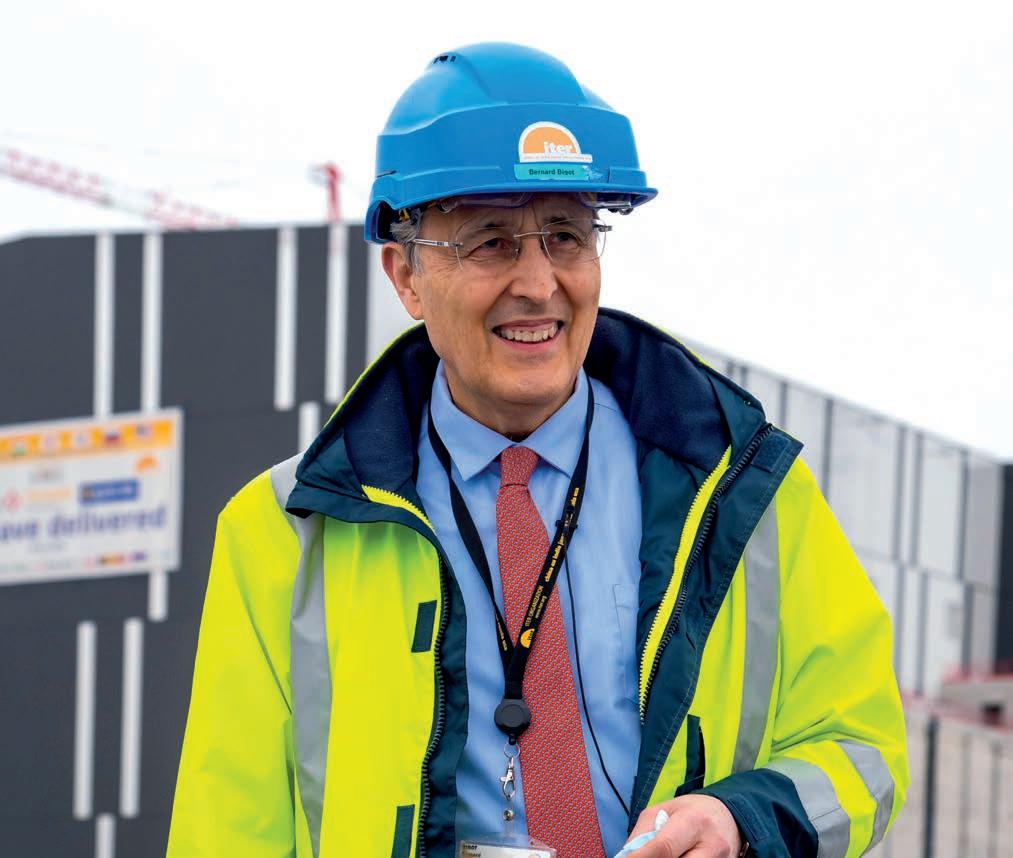








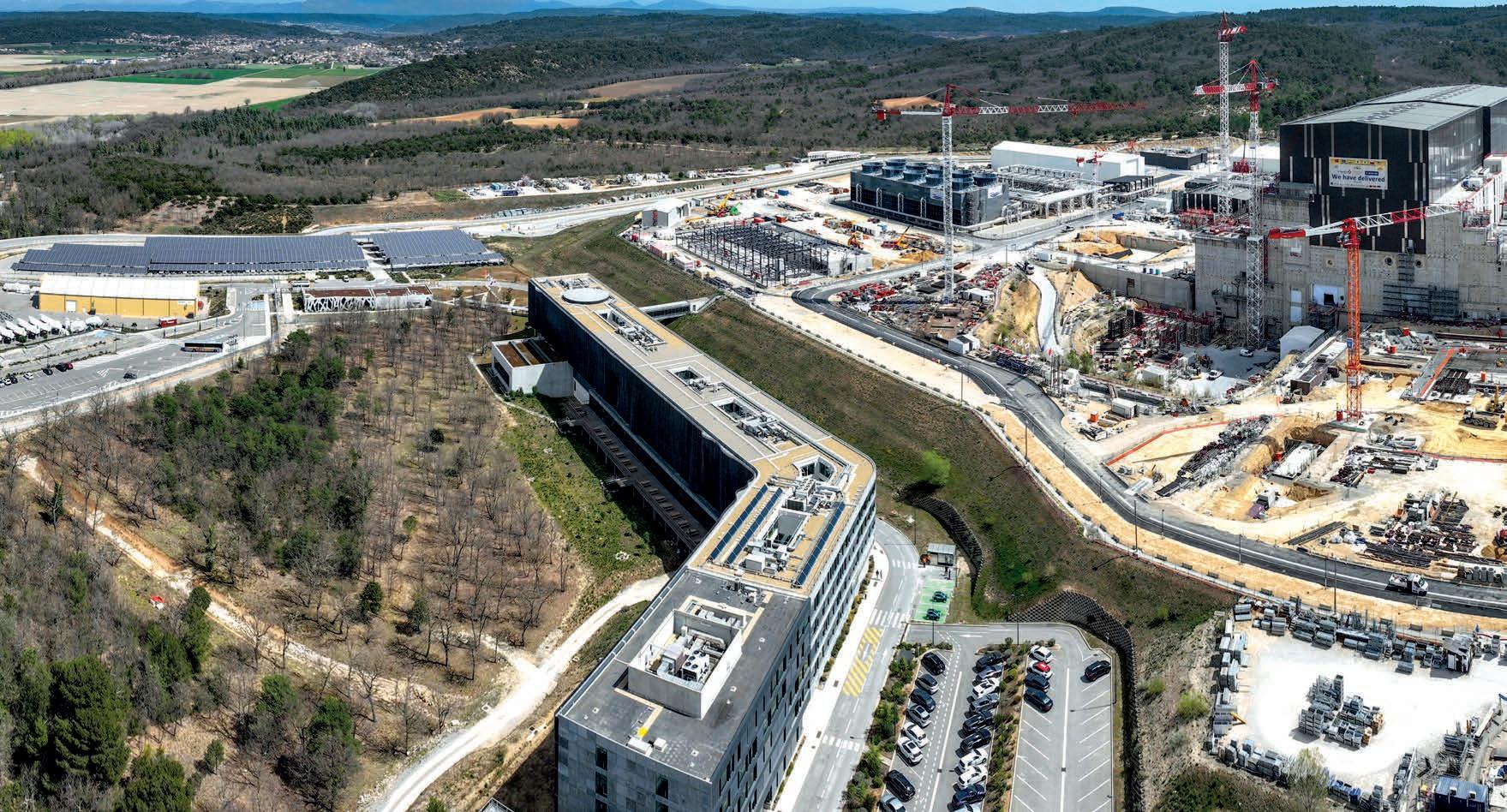

 The ITER scientific installation is rising on this rural site in southern France. Eighty-five percent of the infrastructure required for First Plasma is now in place. April 2022
The ITER scientific installation is rising on this rural site in southern France. Eighty-five percent of the infrastructure required for First Plasma is now in place. April 2022












 The ITER scientific installation is rising on this rural site in southern France. Eighty-five percent of the infrastructure required for First Plasma is now in place. April 2022
The ITER scientific installation is rising on this rural site in southern France. Eighty-five percent of the infrastructure required for First Plasma is now in place. April 2022


A star will soon be born, a star unlike any other ... a star fashioned by human hands. ITER - the Latin word for «The Way» - will light up before the end of this decade.
From a scientific and technological point of view, it will be one of humankind’s historic achievements. The creation of an artificial star and the tapping of the tremendous amounts of energy produced could forever alter the course of civilization.
An unprecedented international collaboration that brings together China, the European Union, India, Japan, Korea, Russia and the United States, the ITER Project marks the culmination of decades of research and years of diplomatic negotiation. What was the aspiration of three generations of physicists is now the reality of thousands of scientists, engineers, and labourers involved in ITER in France and throughout the world.
The seven ITER Members, representing half the world’s population, share the responsibility for building the ITER machine and facilities. Every Member, essentially, is involved in every system and benefits from the generated intellectual property.

As the buildings on the construction platform near completion and First Plasma component manufacturing passes the 90% threshold, ITER is now fully engaged in assembly. The ITER machine is taking shape in the Tokamak pit, where the first section of the vacuum vessel is in place, while in the Tokamak Complex and across the platform, plant systems are being installed and commissioned.
This eighth edition of the ITER photobook aims to take you into the heart of the project – from the rolling hills of Provence to factories on three continents where men and women from 35 nations are bent on realizing one of humankind’s most enduring dreams: capturing the fire of the stars and making it available for generations to come.

The ITER machine is a tokamak, the Russian acronym for Toroidal Chamber, Magnetic Coils. Tokamaks were developed in the 1960s at a time when nations were experimenting with all kinds of different systems to reproduce the nuclear reactions at work in the core of the Sun and stars.
Like a star, the ITER Tokamak will fuse light atoms into heavier ones. A tokamak is a magnificent tribute to Albert Einstein’s E=mc2: the tiny loss of mass that results from the fusion process translates into a huge quantity of energy. One gram of fusion fuel (the hydrogen isotopes deuterium and tritium) generates as much energy as eight tonnes of oil.
ITER will be by far the largest and most complex tokamak ever built. Designed from the experience accumulated in hundreds of fusion machines throughout the world, it will demonstrate that fusion energy is scientifically, technologically and industrially feasible.



Work continues into the night on the ITER site. Inside the tall Tokamak Building, teams are assembling the ITER machine from bottom up. November 2021
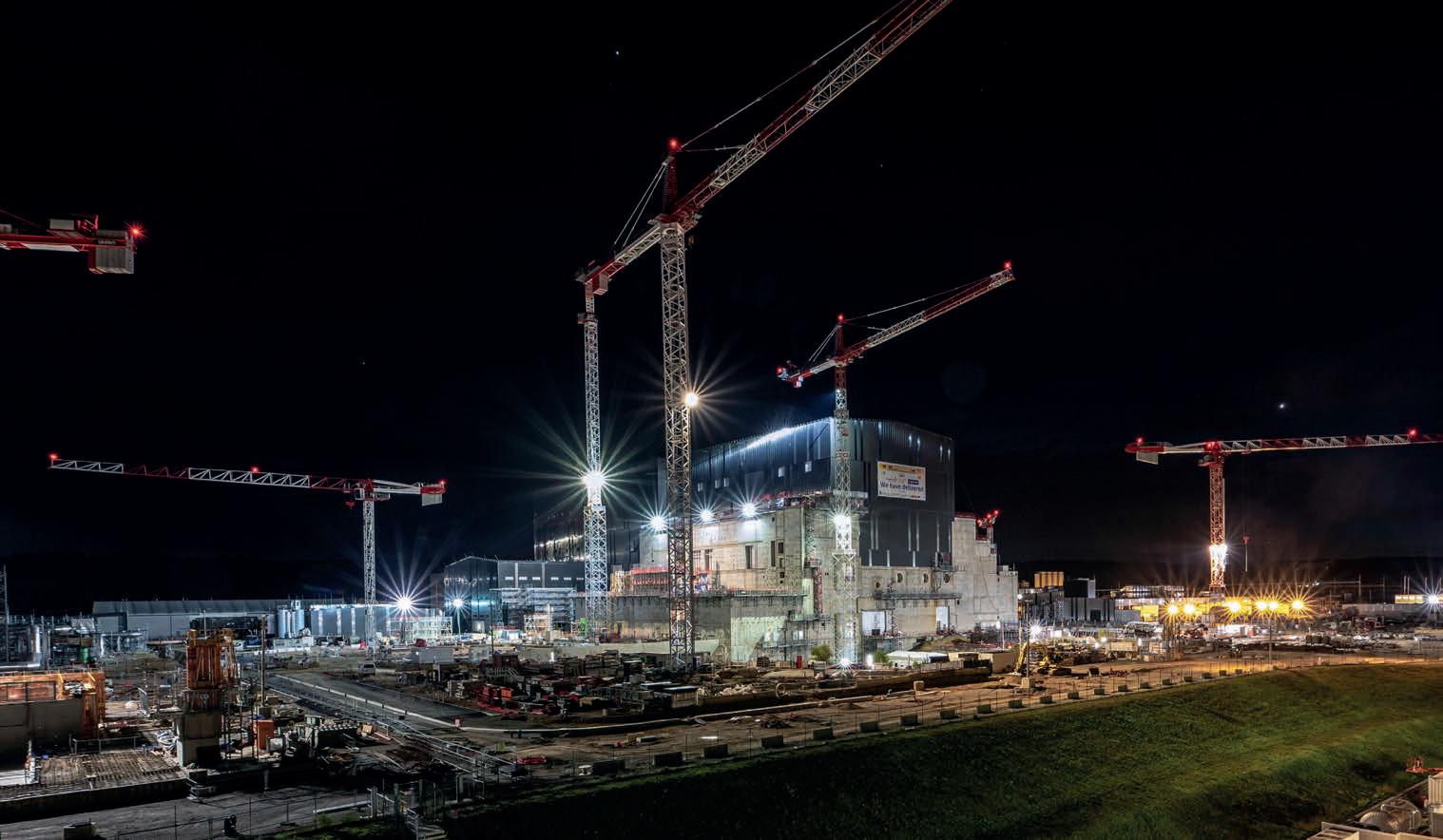
Machine assembly has been underway in the Tokamak pit since May 2020.

liked to compare it to “a very intricate puzzle, requiring a truly unique amount of planning.” April 2021




ITER component convoys—like this one transporting cryostat top lid segments from India—travel to ITER over four nights to minimize disruption to local traffic. February 2021



Around the central Tokamak Complex are all of the industrial plant systems—cooling, power, cryogenics, heating, fuel cycle, diagnostics—that enable the operation of the ITER machine. April 2022
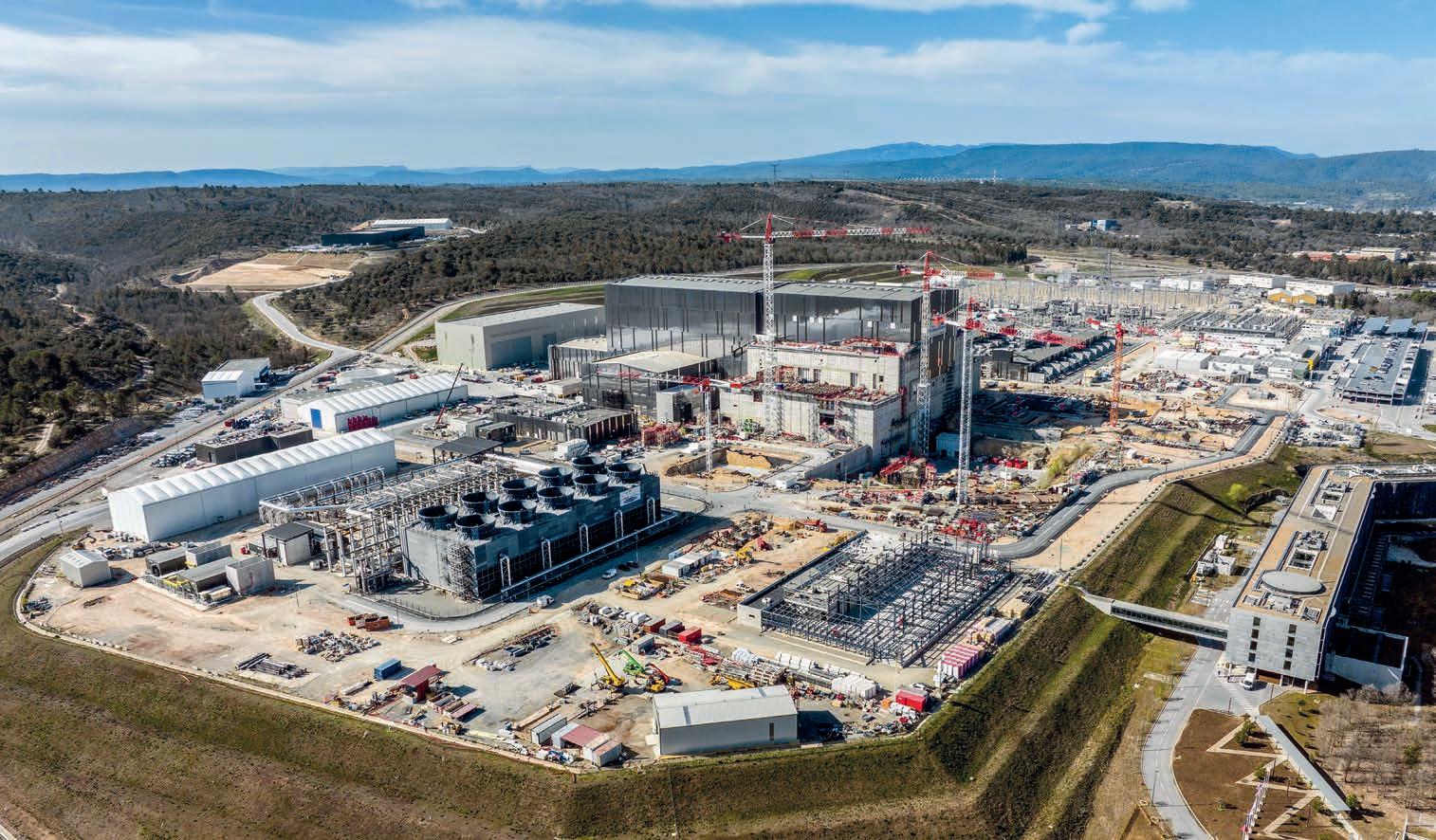



The lower cryostat thermal shield is installed in January. From its position at the bottom of the machine, this thin, silver-coated component will form a heat barrier to protect the superconducting magnets. January 2021
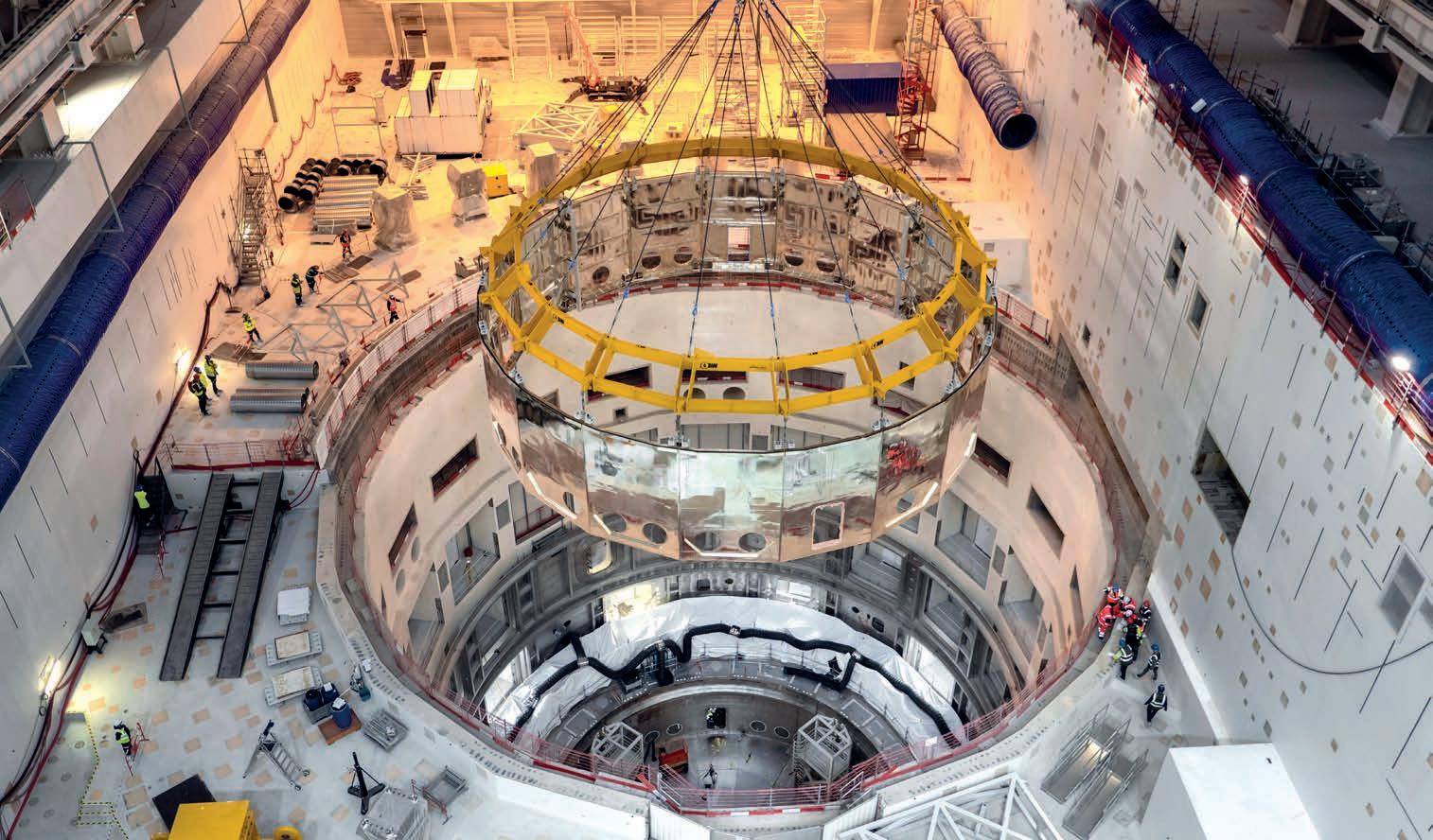






Put end to end, the cables planned for ITER’s underground galleries could reach the Peruvian capital Lima from the south of France (10,000 kilometres). This tall gallery is the starting point for the 66 kV cable network, which connects converters in the electrical switchyard to equipment inside the Magnet Power Conversion buildings. February 2021
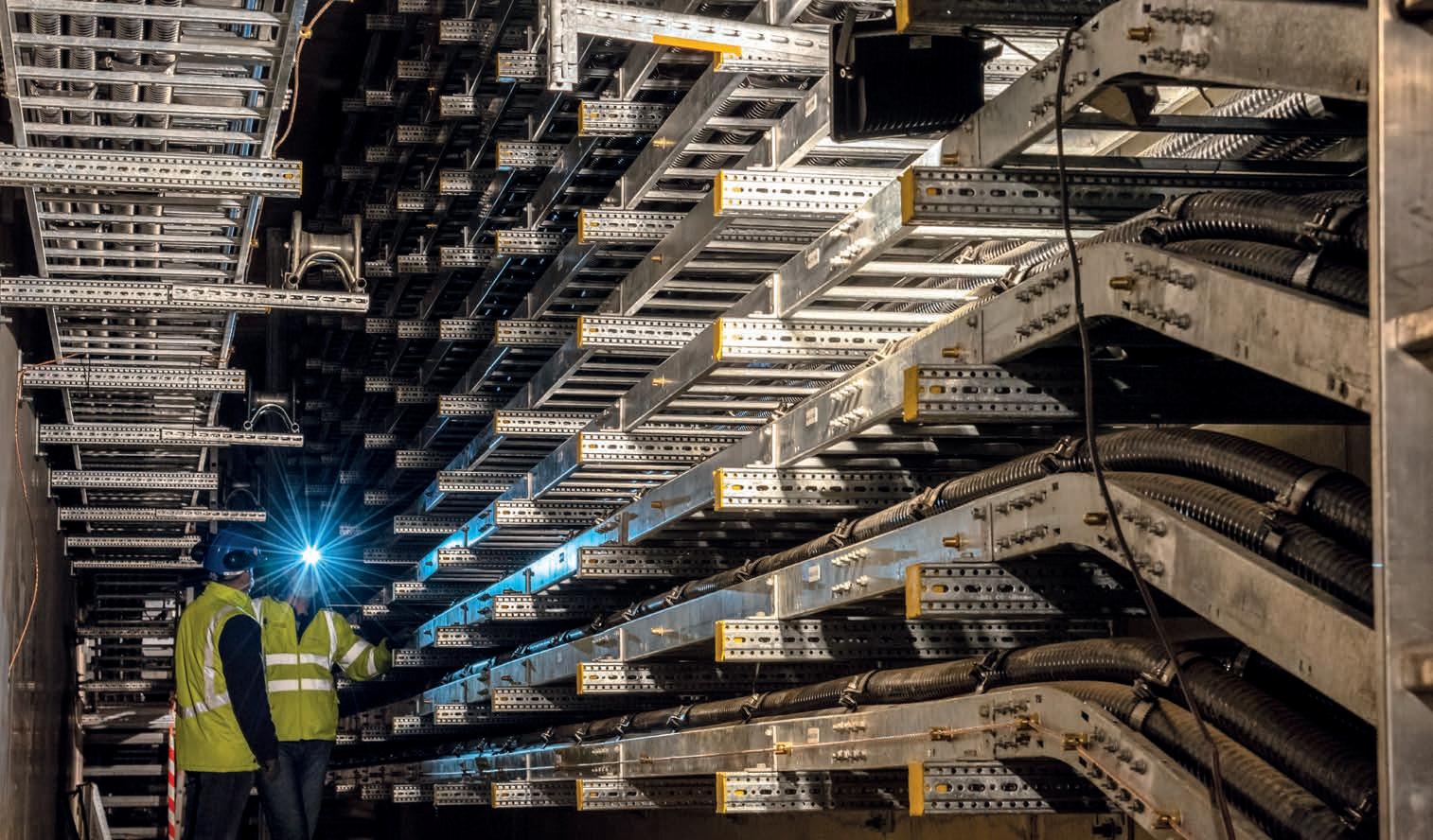


The segments of the cryostat lid arrive early in the year from India. They will be aligned and welded on the platform at the far end of the Cryostat Workshop. February 2021

The installation of the first magnet, the 330-tonne poloidal field coil #6 (PF6), is a major assembly milestone. April 2021






Each of ITER’s 31 magnet feeders is produced and shipped in three segments by China. That’s approximately 100 feeder large components that must be installed in the Tokamak Complex. January 2021

The full arena for machine assembly comprises the vast Assembly Hall, where components are prepared for handling and installation, and the Tokamak pit (far end). April 2022


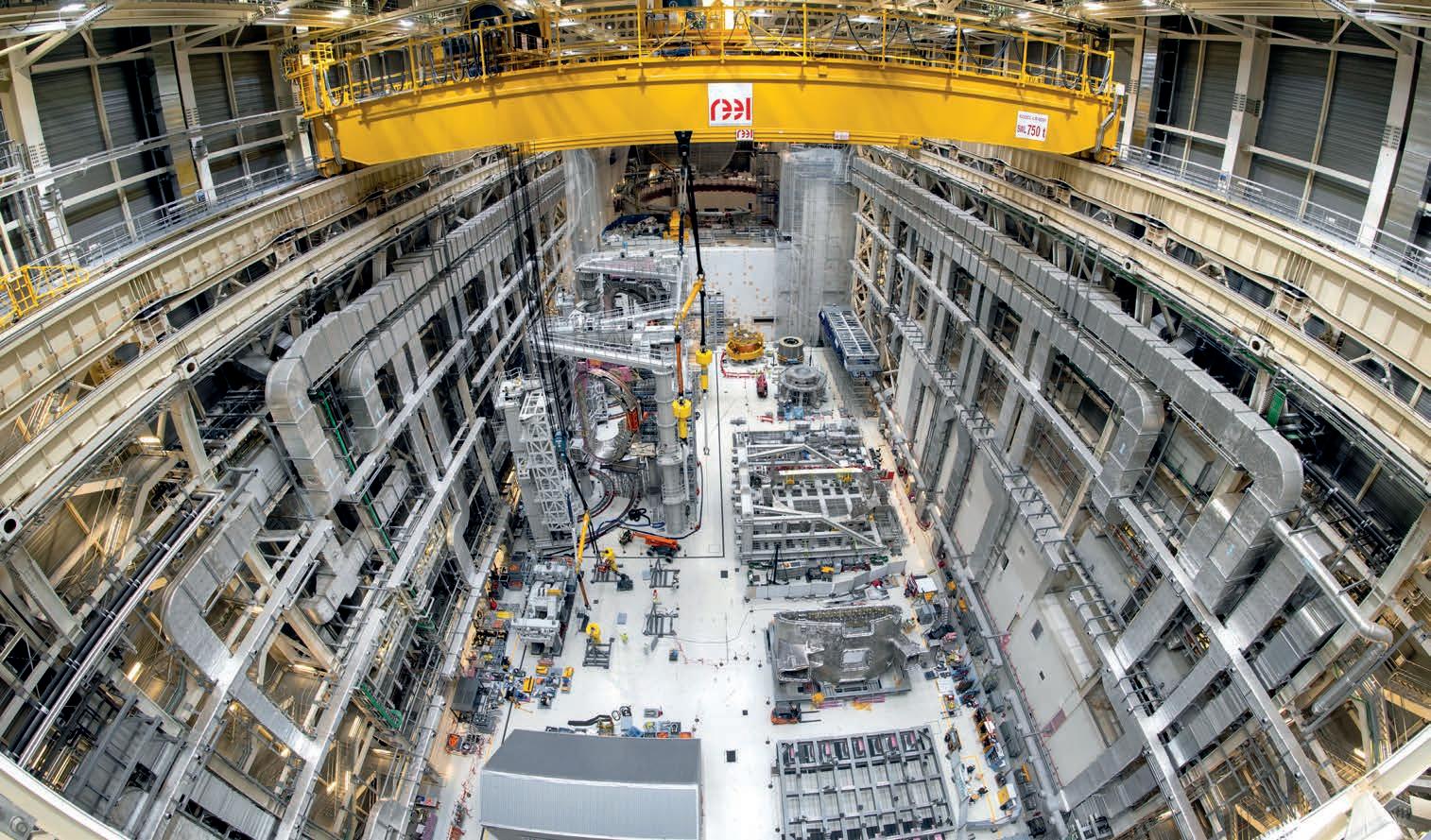


On these twin sector sub-assembly tools in the Assembly Hall, a vacuum vessel sector can be associated with its thermal shield and two toroidal field coils to form a sector module, or one-ninth of the ITER plasma chamber. One sector module was finalized in 2021 and a second is underway. January 2022
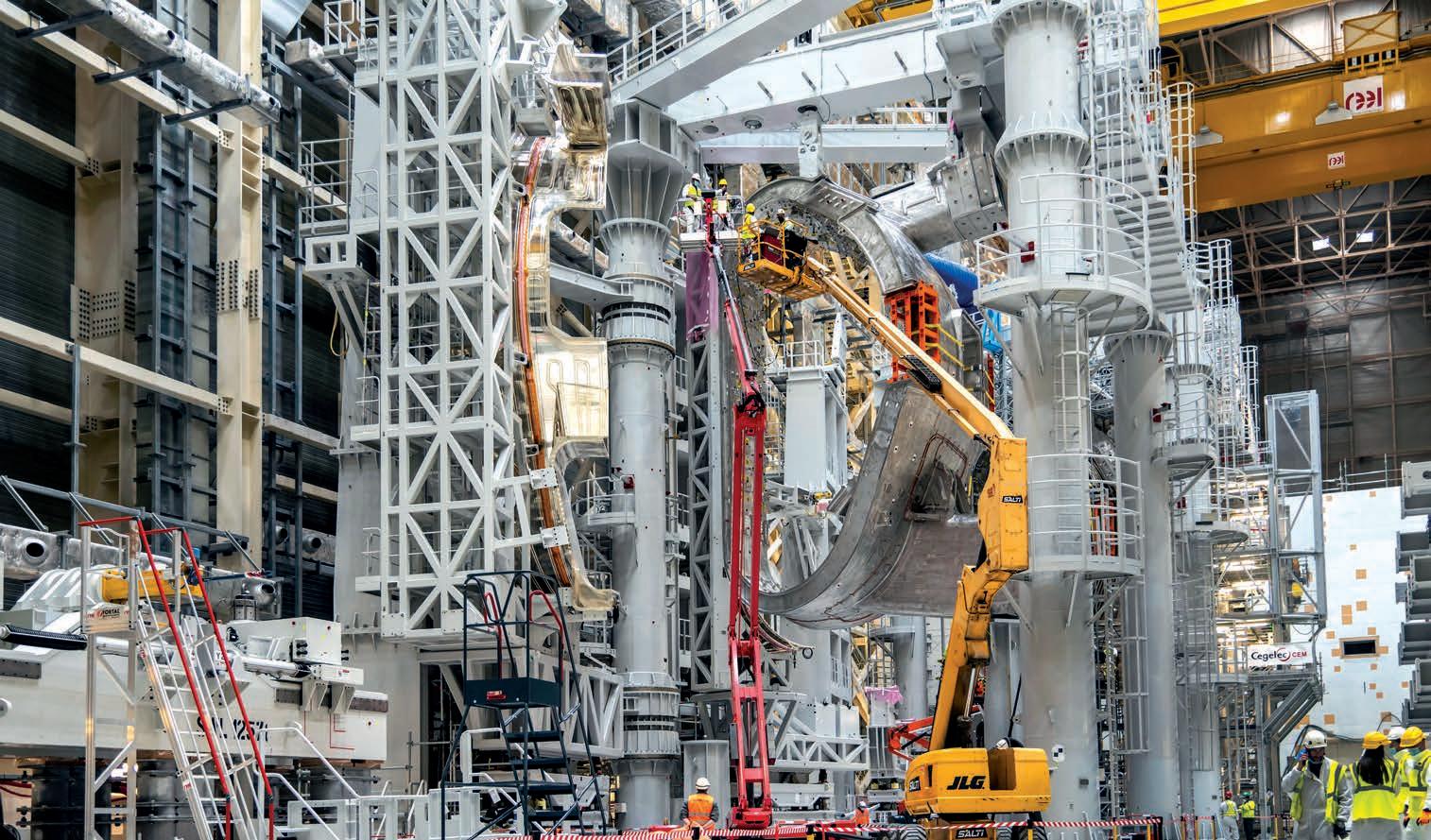


Tokamak assembly is a mix of spectacular operations, such as when giant components are lifted and positioned with complete accuracy, and less visible activities requiring near surgical-like precision. Creating the superconducting joints that join magnet feeder segments (photo) falls into the latter category. March 2022
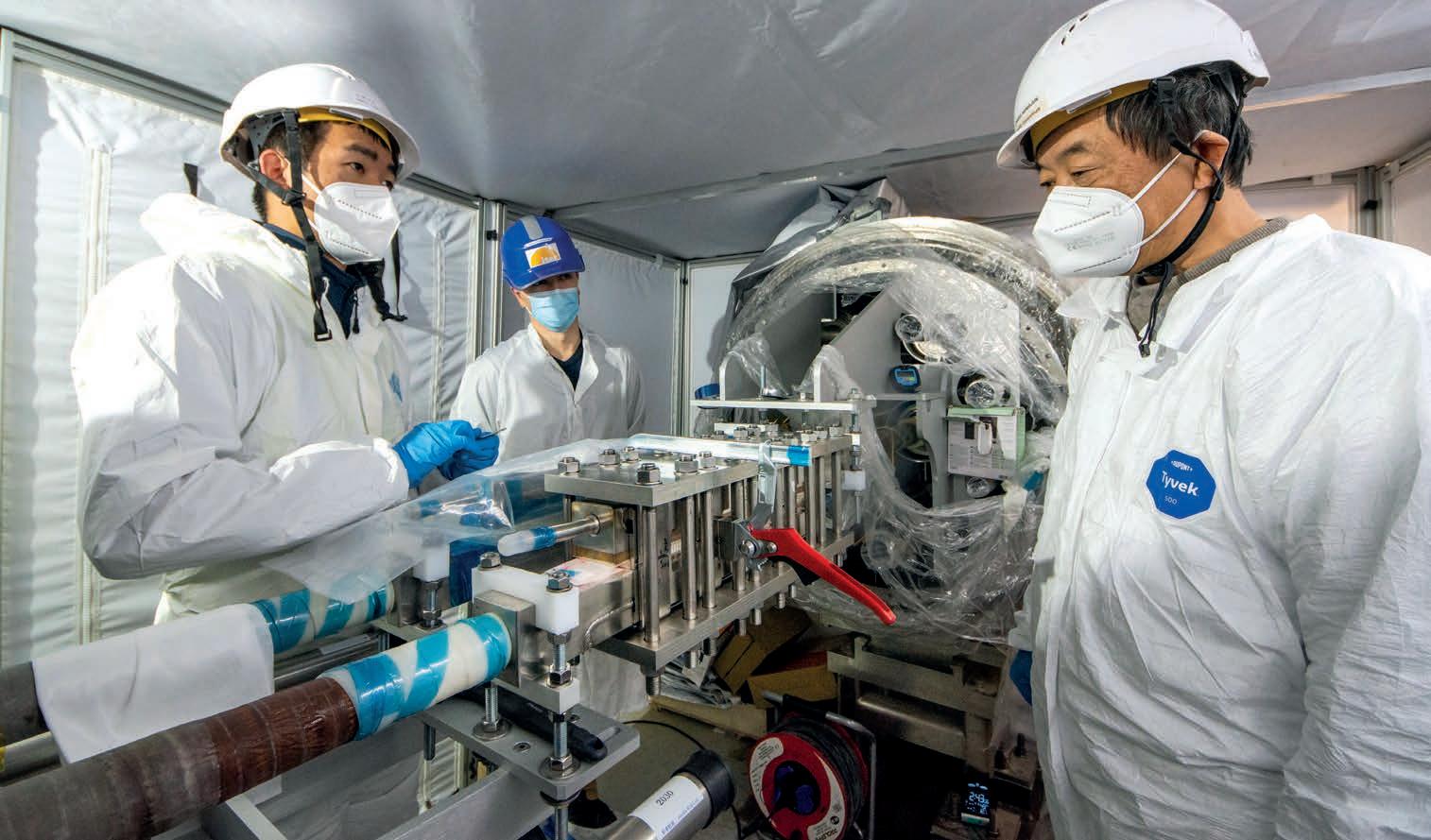





The first vacuum vessel sector to arrive at ITER—sector #6 from Korea—is upended on specialized tooling in March. In this vertical position, it can be installed on sector sub-assembly tooling and prepared for final transfer to the Tokamak pit. March 2021


Diagnostics are added to the toroidal field coils before they are moved to assembly tooling. March 2021



The first of six central solenoid modules is transferred to a staging area in the Assembly Hall. Six modules will be stacked to form the 1,000-tonne central magnet of the ITER machine. February 2022


As contractors complete the installation of reactive power compensation and harmonic filtering equipment from China, the focus turns to testing. These 8-metre-tall thyristor-controlled reactors are the first to be energized and put through their paces. April 2021




Between the hooks of the overhead crane and the 440-tonne sector module are rigging elements (in yellow and light grey) that act as veritable tools, with the capacity to control the load’s centre of gravity and pilot the rotation of the component. April 2021
ITER ORGANIZATION • PROGRESS IN PICTURES 2021-2022
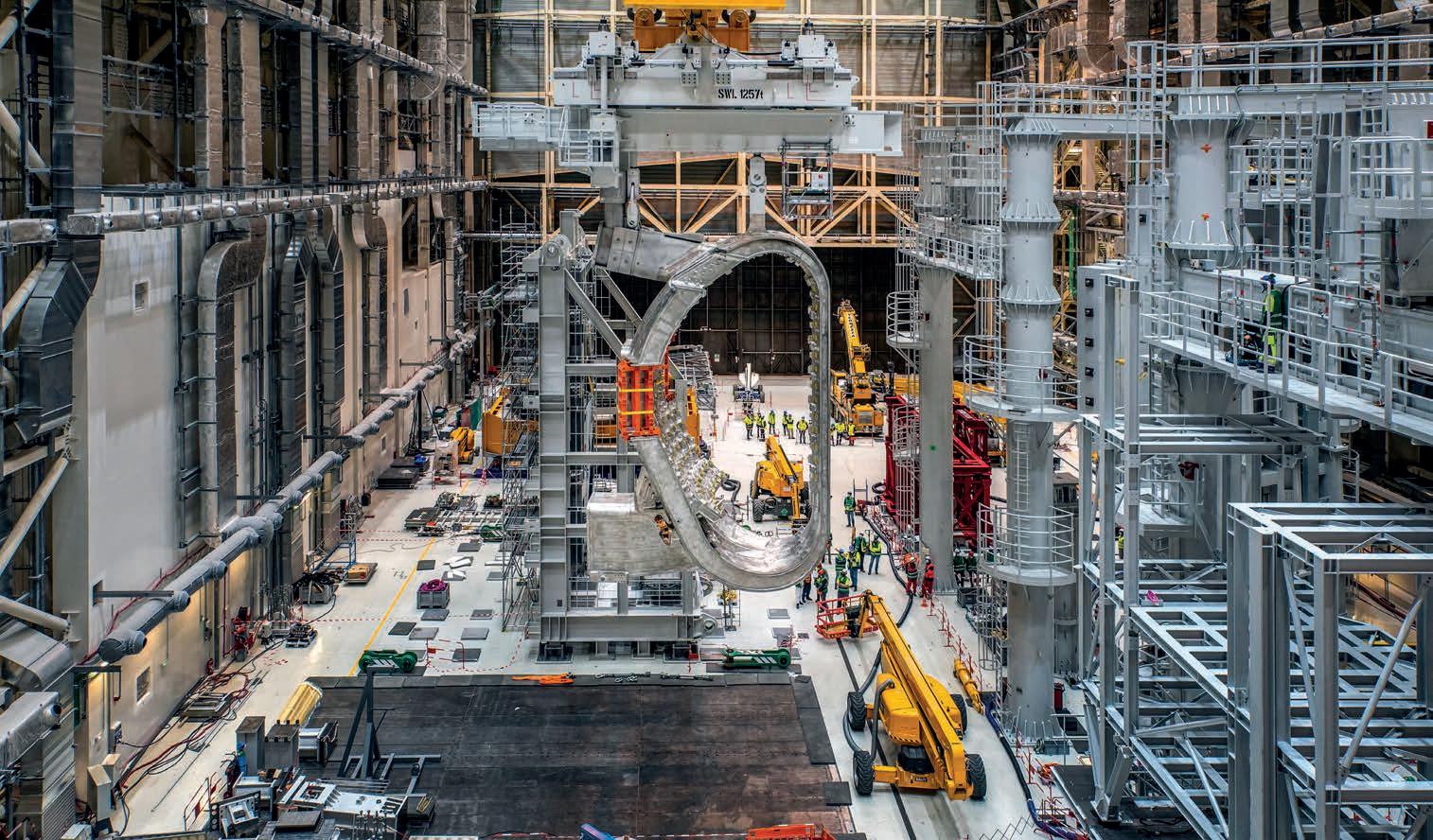


Arms are lifted in triumph as the first poloidal field coil produced by European contractors in the on-site winding facility, PF5, passes all testing. A second coil (PF2) is completed in December. April 2021




Work is advancing on the ITER Control Building. This 18 m x 43 m space will be the main control room, where scientists, engineers and operators monitor machine operation and analyze the data they receive from each pulse. May 2022


Approximately 1,200 people work directly for the ITER Organization, most based out of ITER Headquarters (foreground). In addition, 2,500 ITER Organization contractors and 1,400 Fusion for Energy (F4E) contractors and staff work daily on site. May 2021



The ITER Robots competition—now accredited by the French Ministry of Education—returns in June for the 10th edition. Participation gives students the opportunity to measure the remote handling challenges faced at ITER, but not only. It also teaches the value of team working, shared responsibility and problem solving. June 2021
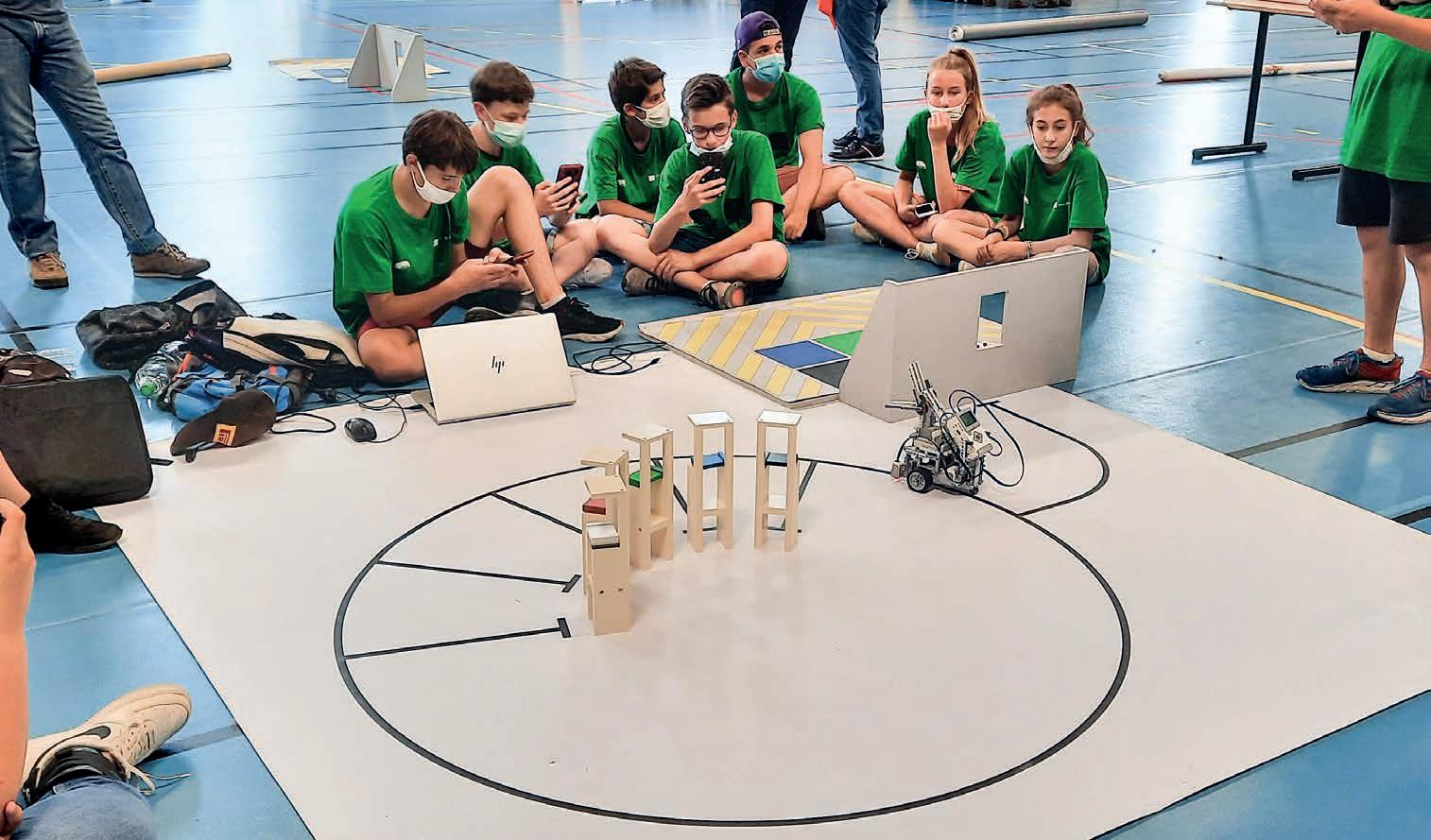

In 2021, the assembly pit is declared “ready” for the first vacuum vessel sector after all captive components (like the magnet feeders pictured here) are installed. June 2021
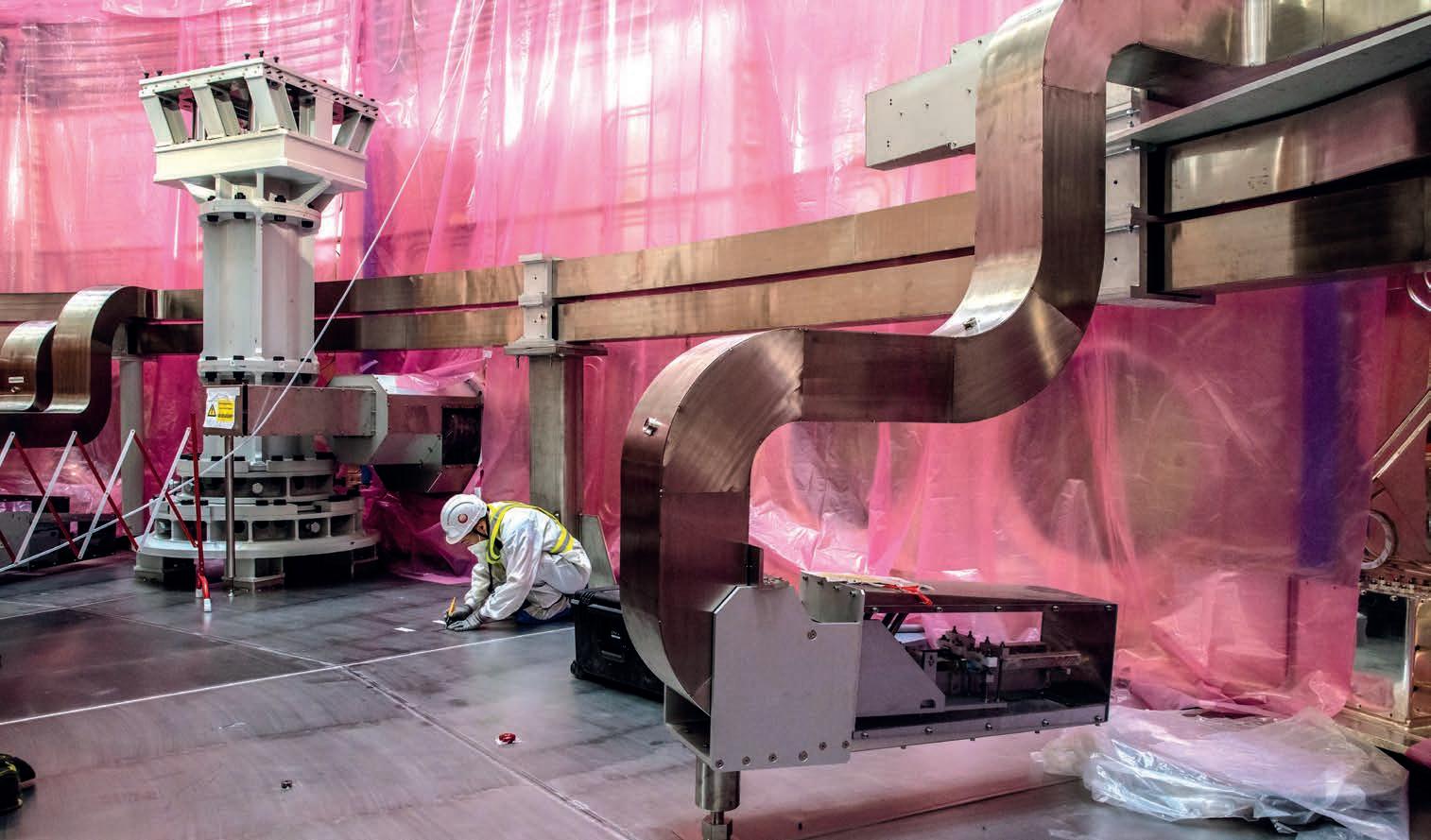
For the second year in a row, ITER Council meetings are held by video conference. Through close coordination and cooperation, the ITER Organization and the seven Domestic Agencies have kept the project on its forward-moving trajectory despite challenges related to the Covid-19 pandemic. June 2021


2021-2022


From above, it looks like the pieces of an Erector Set have been laid out for assembly. Some components require only a few weeks of staging in the Assembly Hall before moving into place in the Tokamak pit; others spend months in dedicated tooling. March 2021

This vacuum vessel sector, still resting on its side, is being equipped with supports for instrumentation and diagnostics. March 2021




At the very bottom of the Tokamak pit, inside the “soupbowl-like” depression in the cryostat base, teams are installing captive components like the slim magnet feeder lines that will deliver cryogenic fluids and electricity to the lower poloidal field coils. March 2021



A second vacuum vessel sector (#1(7)) arrives from Korea in August. The nine 40-degree sectors required to form the ITER toroidal chamber are largely similar, differing only in the details relevant to their position in the circular arrangement and interfacing components. August 2021



Once in tooling, a vacuum vessel sector is paired with its silver-coated thermal shield (visible in this picture) and two toroidal field coils. The result is a vacuum vessel sector module, ready for transfer into the Tokamak pit. July 2021



The seventh group of Monaco Fellows (2020-2022) has started at ITER thanks to funding from a longstanding partnership between the Principality of Monaco and the ITER Organization. The Fellows contribute to advancing ITER’s top research priorities while gaining invaluable experience alongside world experts in fusion science and engineering. July 2021
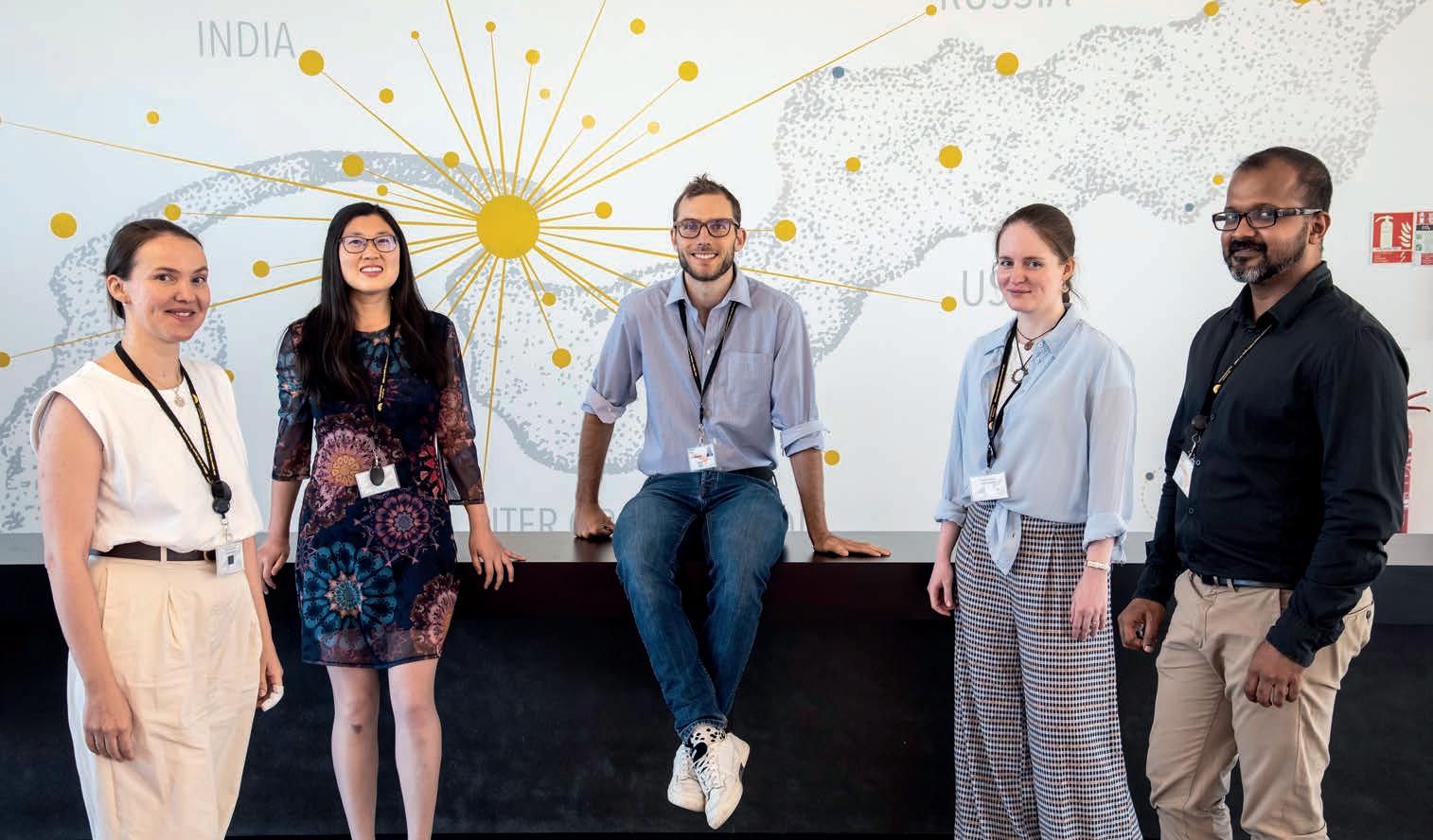

The double doors are closing behind poloidal field coil #5 (PF5), which has just been delivered from temporary storage into the Assembly Hall. It will be lifted from its modular transport vehicle and set on temporary supports until its installation in the Tokamak pit. July 2021





After several months of pre-assembly activities, such as the installation of diagnostics and instrumentation, sector #1(7) is upended and transferred to the available sector sub-assembly tool. (In this photo, the sector has been paused temporarily for pin removal before docking.) December 2021



For every lift in the Assembly Hall, specialized rigging is installed between the overhead crane and the load (pictured, rigging for the upending tool). The bridge cranes overhead can travel the full length of the assembly theatre, working singly (750 tonnes) or in tandem (1,500 tonnes). September 2021
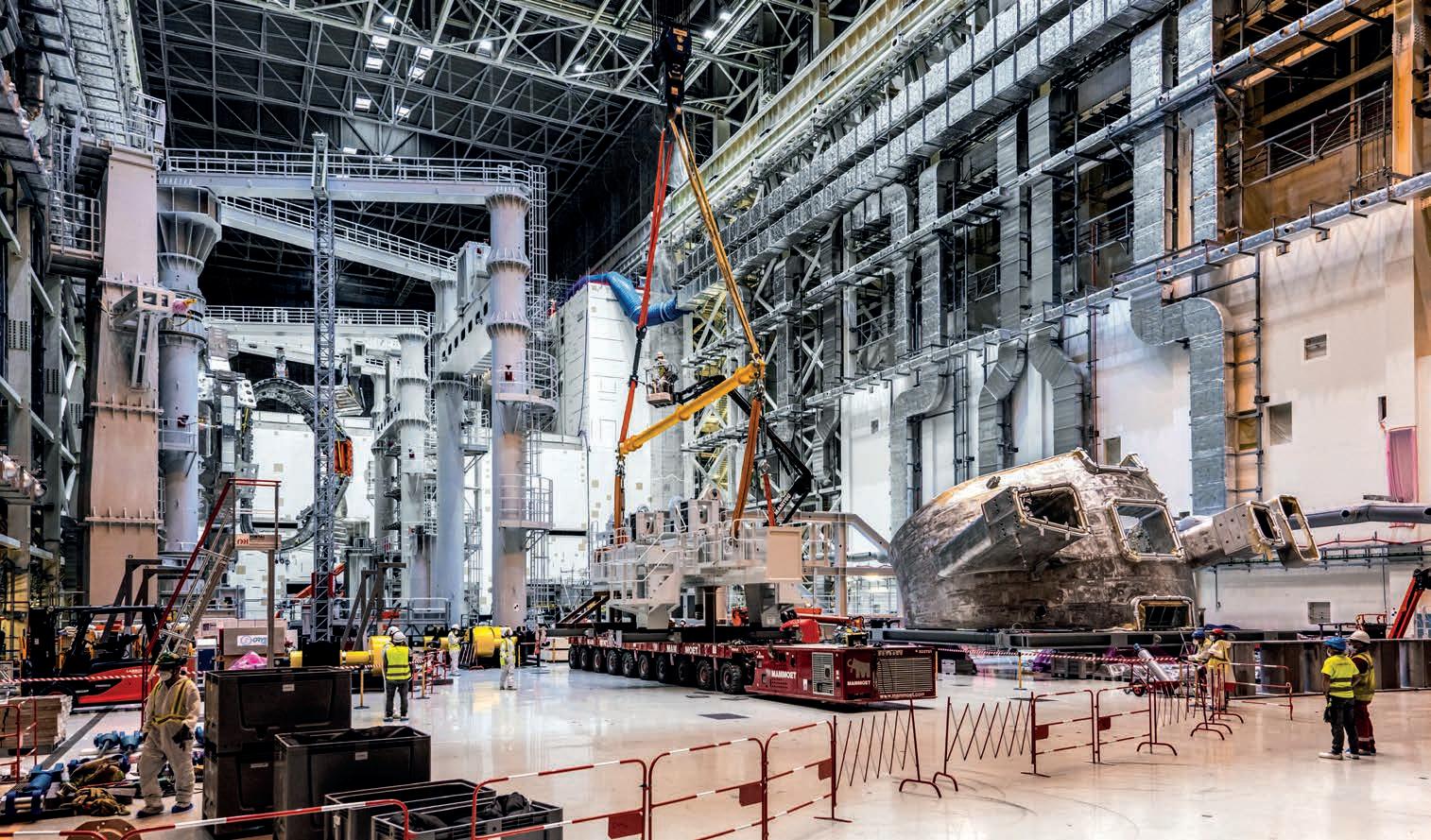

Once installed, components and materials must be kept in good condition until they enter service. Here, a worker performs a white cloth test to check for moisture on a cryostat support bearing during a preservation inspection. September 2021



The transport of ITER components is managed by global logistics provider DAHER, which coordinates every aspect of worldwide logistics including storage, insurance, handling, and customs management. Some loads are categorized as “Highly Exceptional Loads,” like this vacuum vessel sector from Korea. August 2021



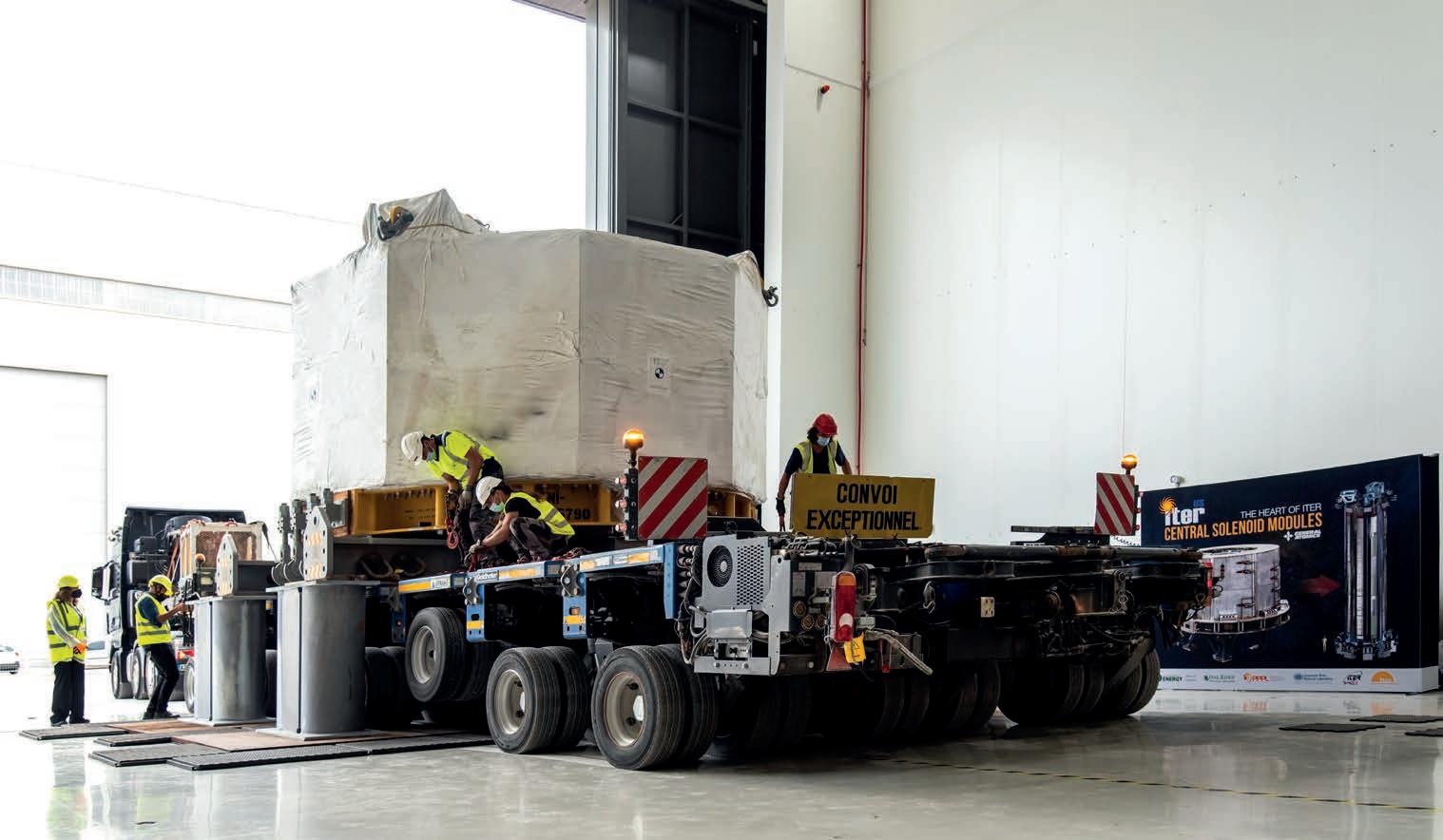


Nine radial beams docked between the central column and brackets on the wall will support the sections of the vacuum vessel as they are welded in the pit. Precise positioning is critical to the alignment of the machine torus. September 2021


Vacuum vessel sector #6 has been “dressed” in its silver-coated thermal shield but not yet assembled with the two D-shaped vertical coils that are waiting on the wings. Final alignment is achieved in October, as components totalling 1,250 tonnes are aligned to within 1 mm of tolerance in the radial, toroidal and vertical directions. September 2021



According to Kadri Simson, European Union Commissioner for Energy, the ITER Project is “a prime example of the European Union’s commitment to climate neutrality by 2050.” During her visit to ITER in September 2021, she also highlighted the positive impact that advances in fusion science and technology are already having on the European economy. September 2021


Of the four sections that make up the ITER cryostat, the top lid is the thickest, second heaviest (665 tonnes) and most structurally complex. The component is finalized by Indian Domestic Agency contractors in March 2022 and handed over to the ITER Organization. September 2021

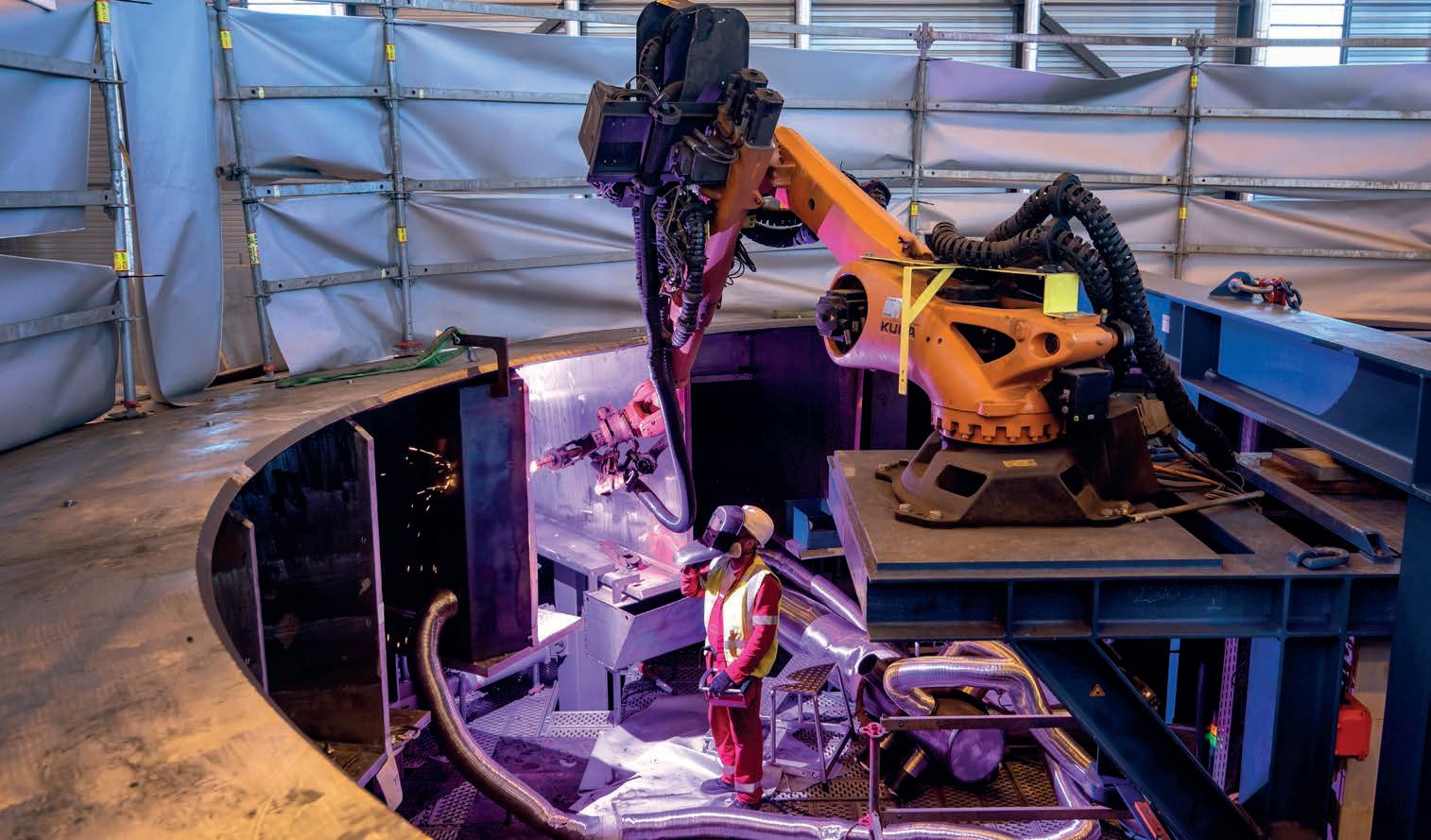


In the ITER Magnet Power Conversion buildings, AC power will be converted into DC current, filtered, and smoothed for the machine’s magnetic system. With all equipment installed in one building and 80% in the other, pre-commissioning testing has started. January 2022





Members of the European Parliament visit ITER in January. «What we have seen and understood today will enable us to promote ITER and fusion, and to share our conviction with our colleagues in the EU Parliament». January 2022
ITER ORGANIZATION • PROGRESS IN PICTURES 2021-2022
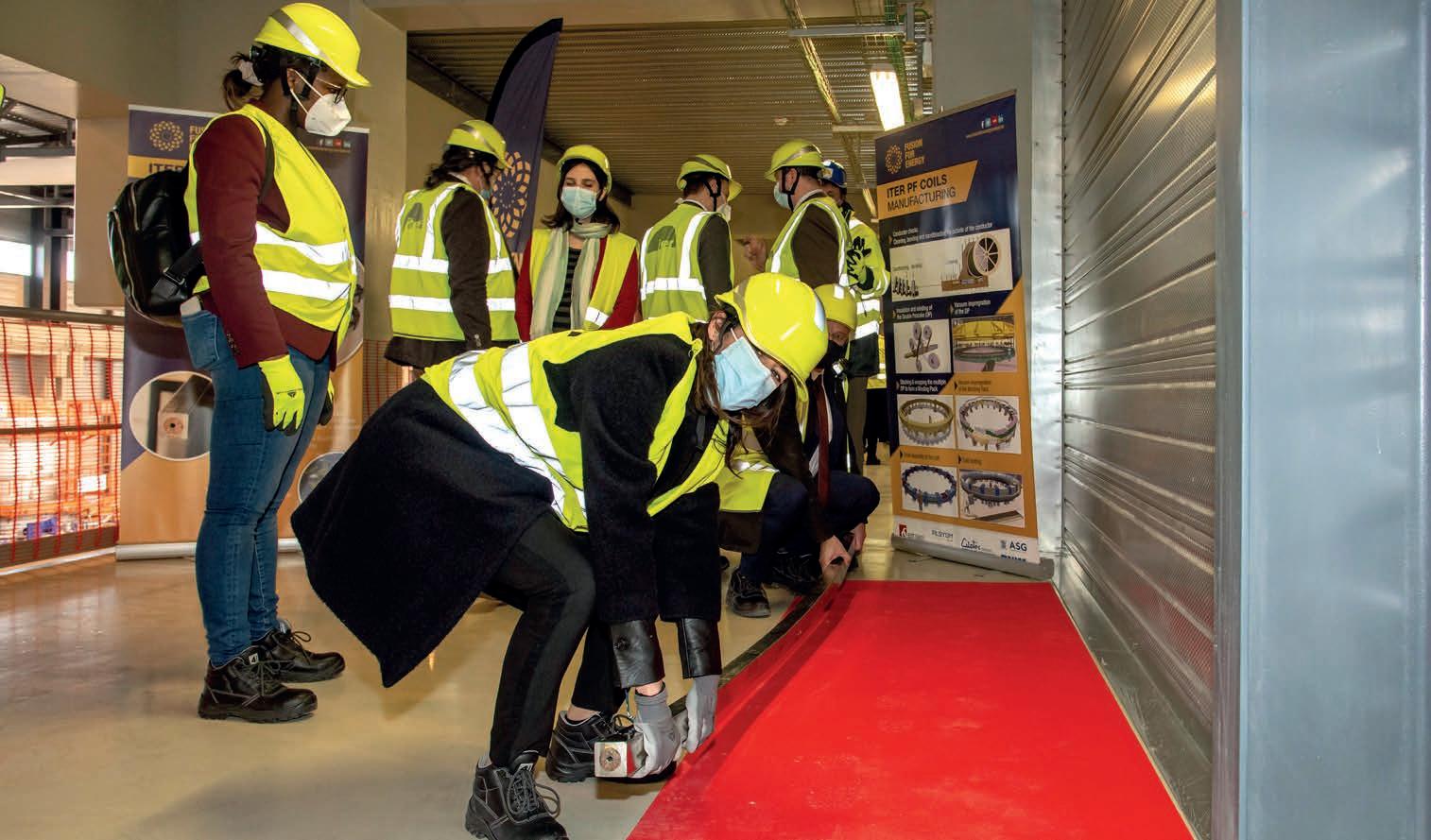

ITER is licensed as an Installation nucléaire de base (INB) in France by the Autorité de Sûreté Nucléaire, ASN. As for any INB in France, the construction of the installation’s buildings, the manufacturing of its components and systems, assembly activities (photo), and the start of each operational phase are all subject to a set of controls and authorizations. December 2021
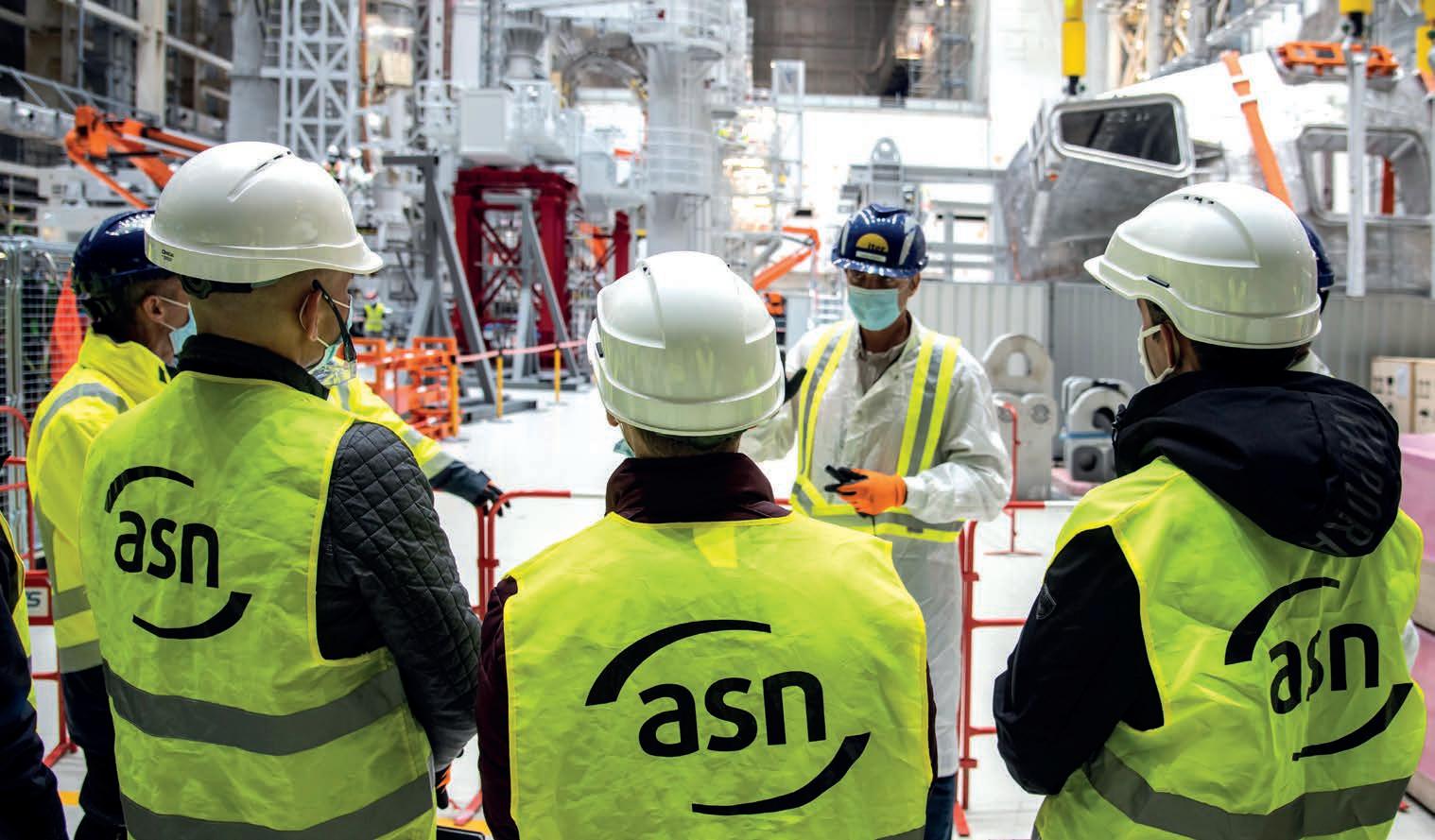


The Assembly Hall is a busy place, with components entering and exiting in different stages of handling, pre-assembly, lifting and transport. The two principal machine assembly consortia—CNPE and DYNAMIC— have learned to share space, tooling and common services in an efficient manner as they execute work packages under the oversight of ITER Organization and MOMENTUM (Construction Management-as-Agent) teams.


Two vacuum vessel sectors are docked in tooling as the assembly teams create the modular sub-assemblies that will be transferred into the pit. From now until the completion of the ninth module, we can expect to see these twin tools constantly in service. April 2022



A project-wide safety day is organized in September 2021 to remind all project contributors—whether they spend their day in an office or in the Tokamak Complex, drive a vehicle or maneuver a crane—that a commitment to workplace safety is essential. September 2021


The formal transfer of the heat rejection system from construction to operation is finalized in August, after the last of the equipment is installed. Commissioning is now underway. October 2021



Pandemic restrictions have kept ITER Communication from organizing its traditional Open Doors Days for two years. In 2021, the team innovates with a virtual event, featuring livestreams, virtual reality, and an on-line exhibition. October 2021
• ITER ORGANIZATION • PROGRESS IN PICTURES 2021-2022
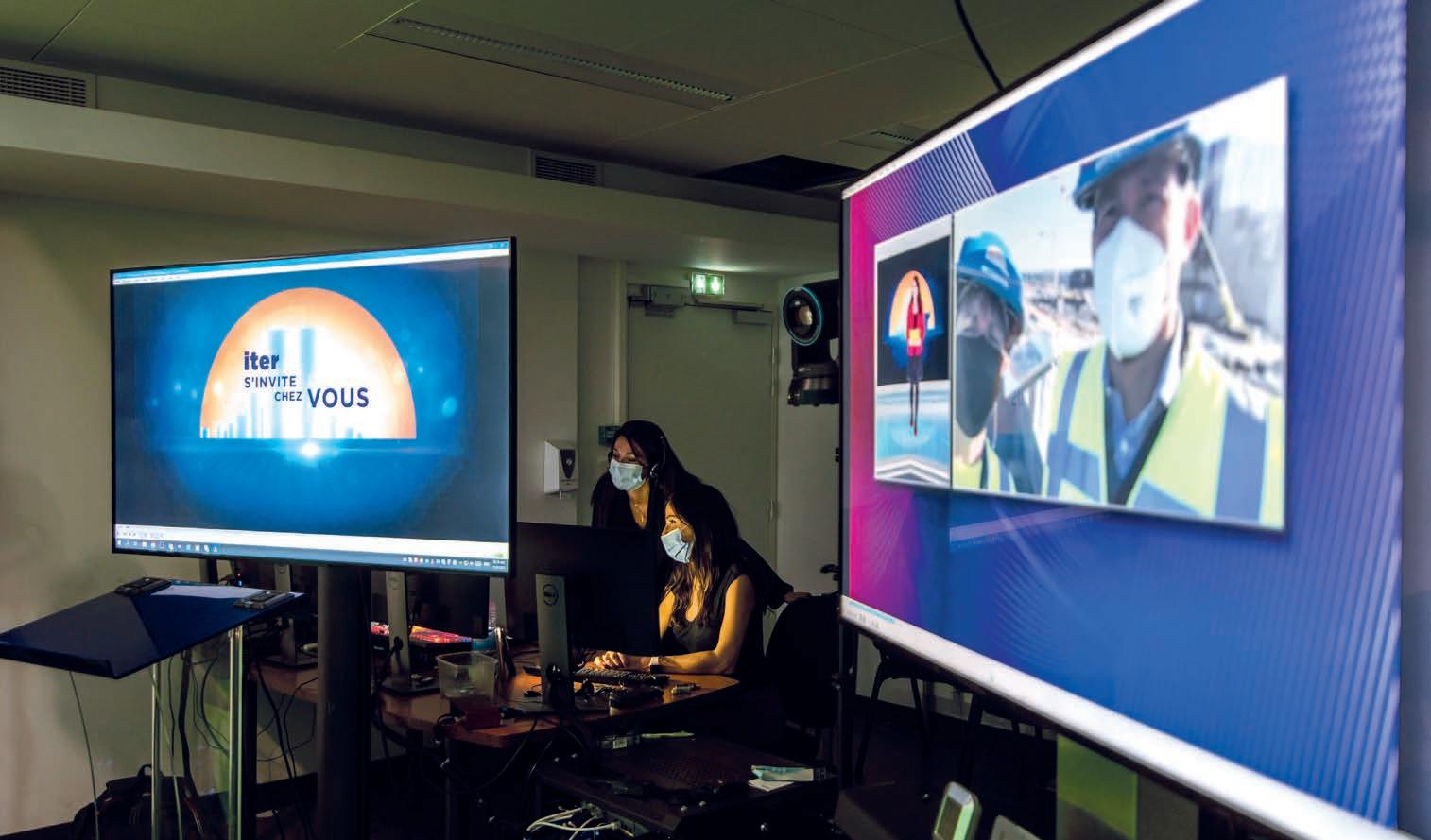

Some 5,000 tonnes of equipment have been installed in the ITER cryoplant. Now, as plant commissioning begins, trucks are rotating on site to fill the exterior tanks with compressed gaseous helium and liquid nitrogen.
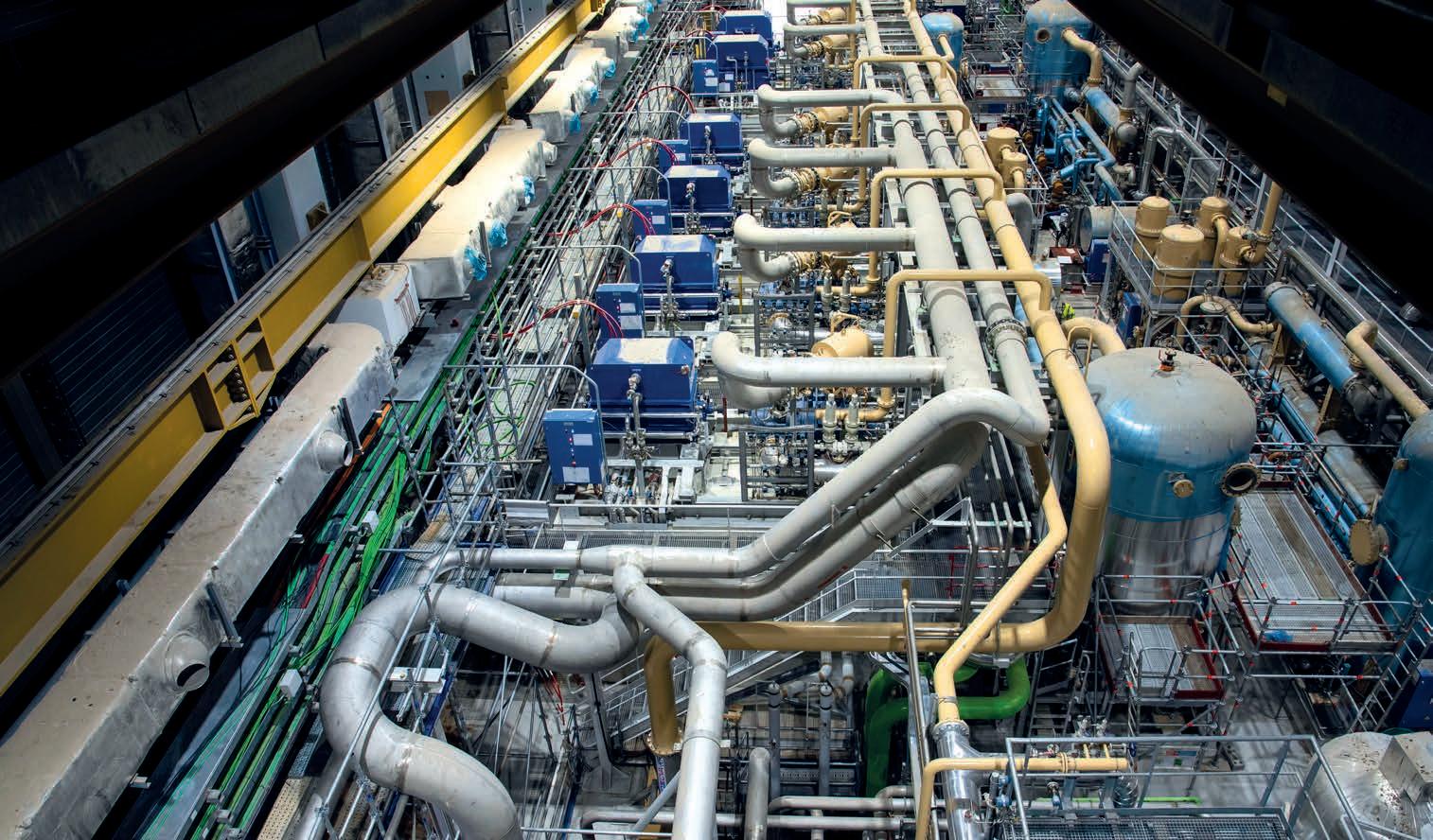


ITER and the world fusion community are present at the United Nations Climate Change Conference, COP26, organized in Glasgow, Scotland. Through a series of events—including this international panel led by ITER Director-General Bernard Bigot—fusion has “a place at the COP table” for the first time. November 2021
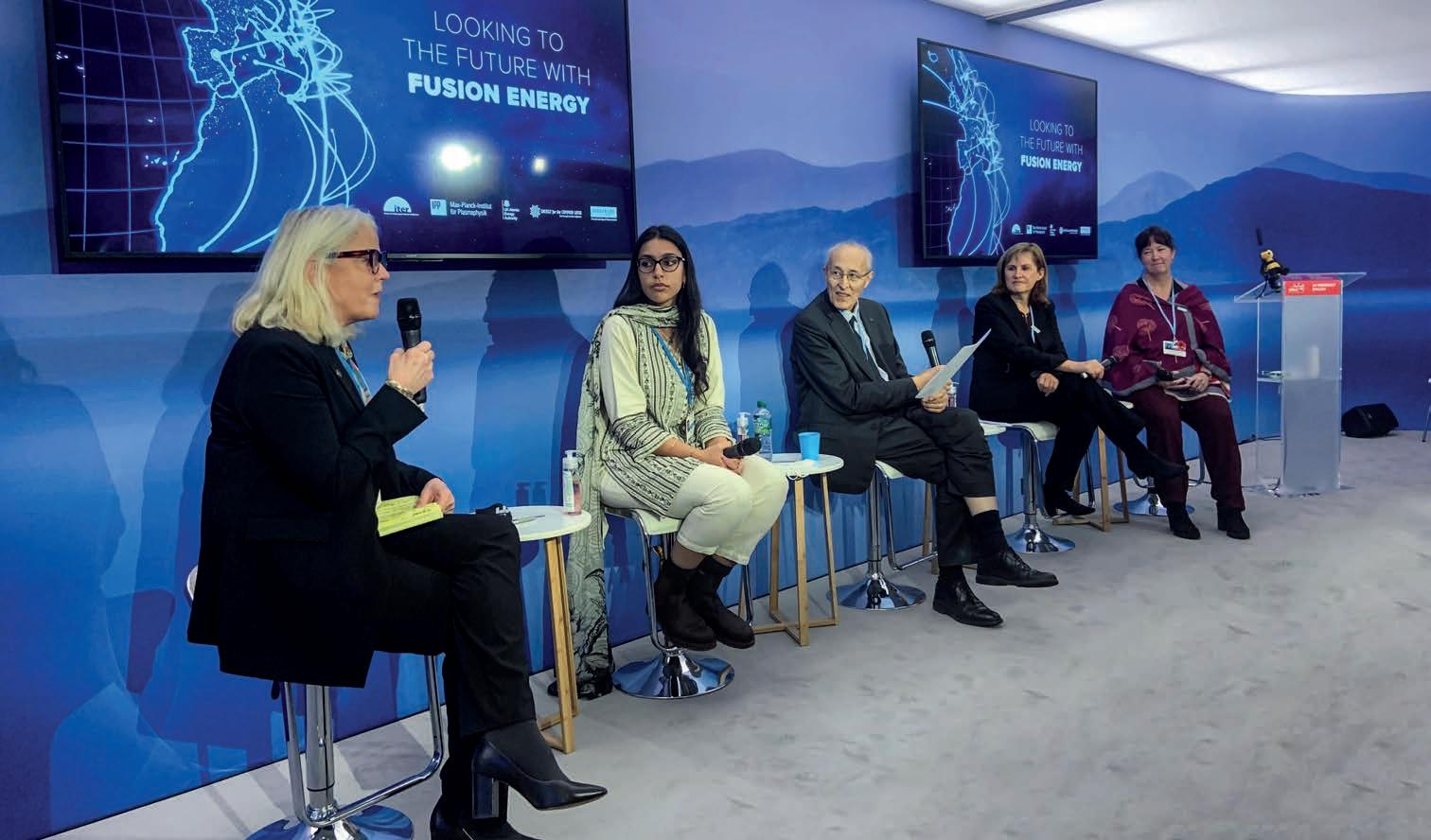

The ITER machine is taking shape in this 30-metre-wide, 30-metre-tall “pit” inside the Tokamak Building. In 2021, the teams install two ring-shaped poloidal field coils, bottom correction coils, the lower cryostat thermal shield, spare compression rings, and the central column on the in-pit assembly tool. December 2021
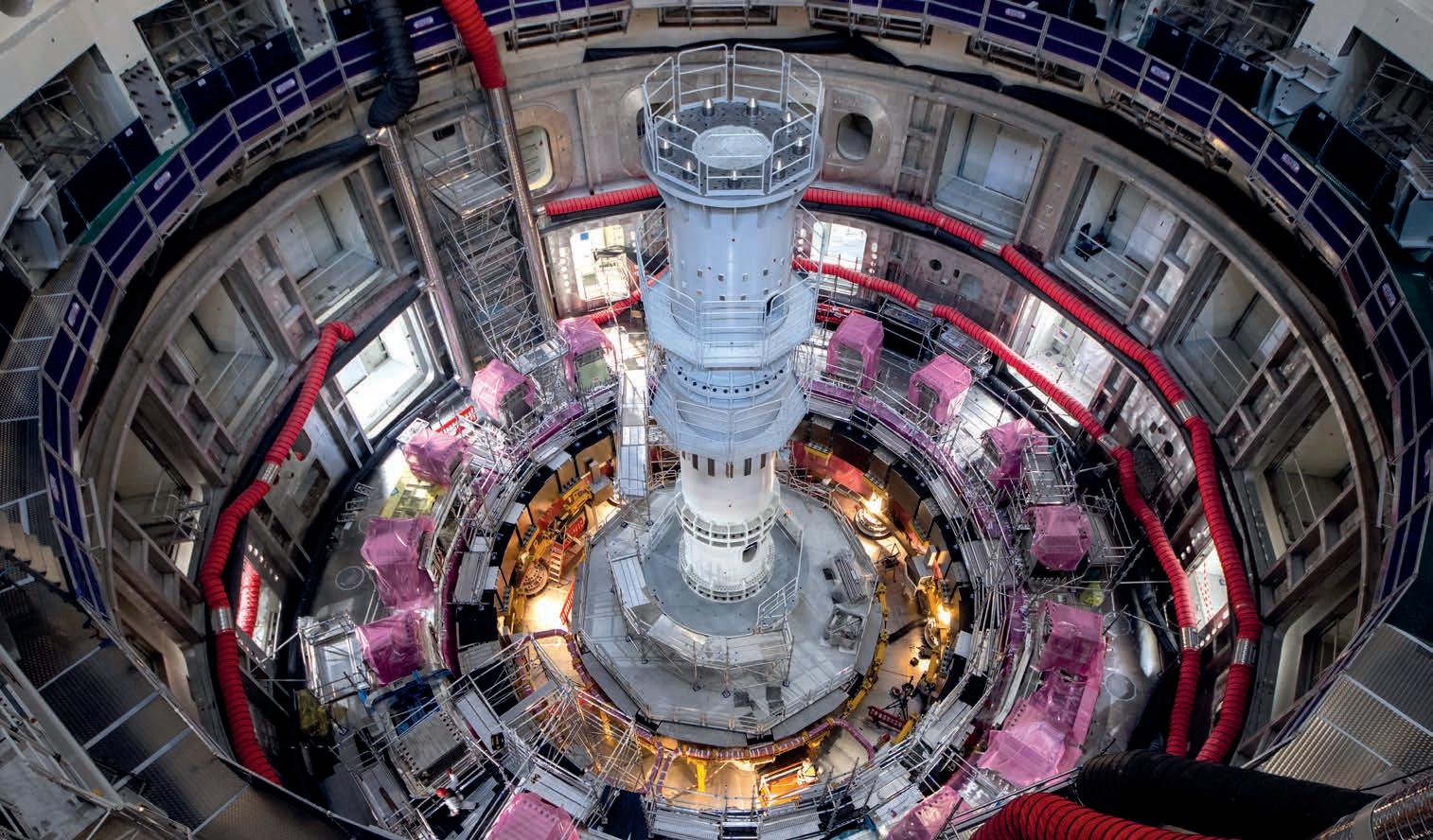


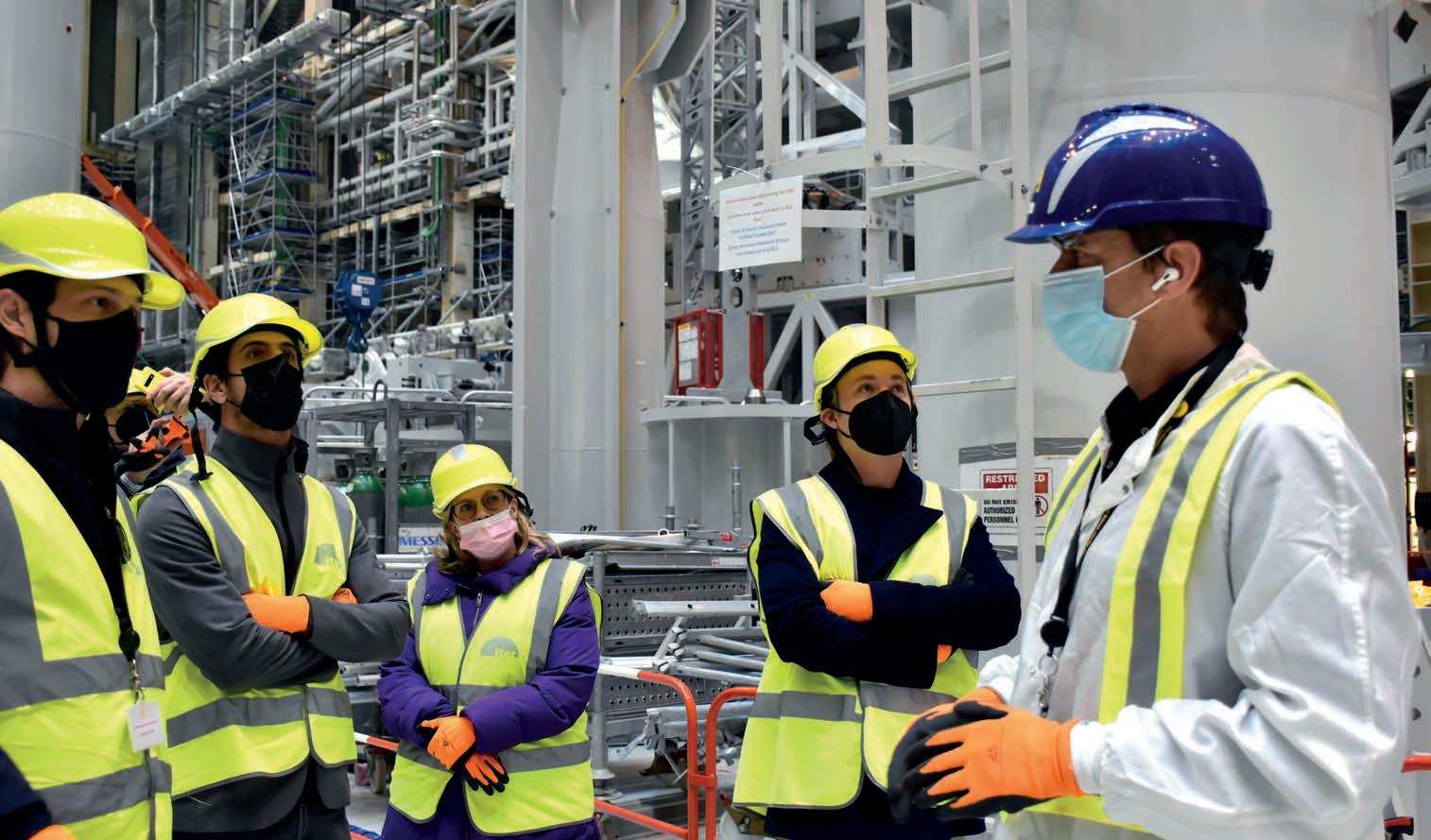

All the elements are now in place in the Assembly Hall to start building the 1,000-tonne, 18-metre-tall central solenoid: a dedicated assembly platform (top right), the first module of the stack (top left), and a purpose-built lift tool (in yellow). April 2022
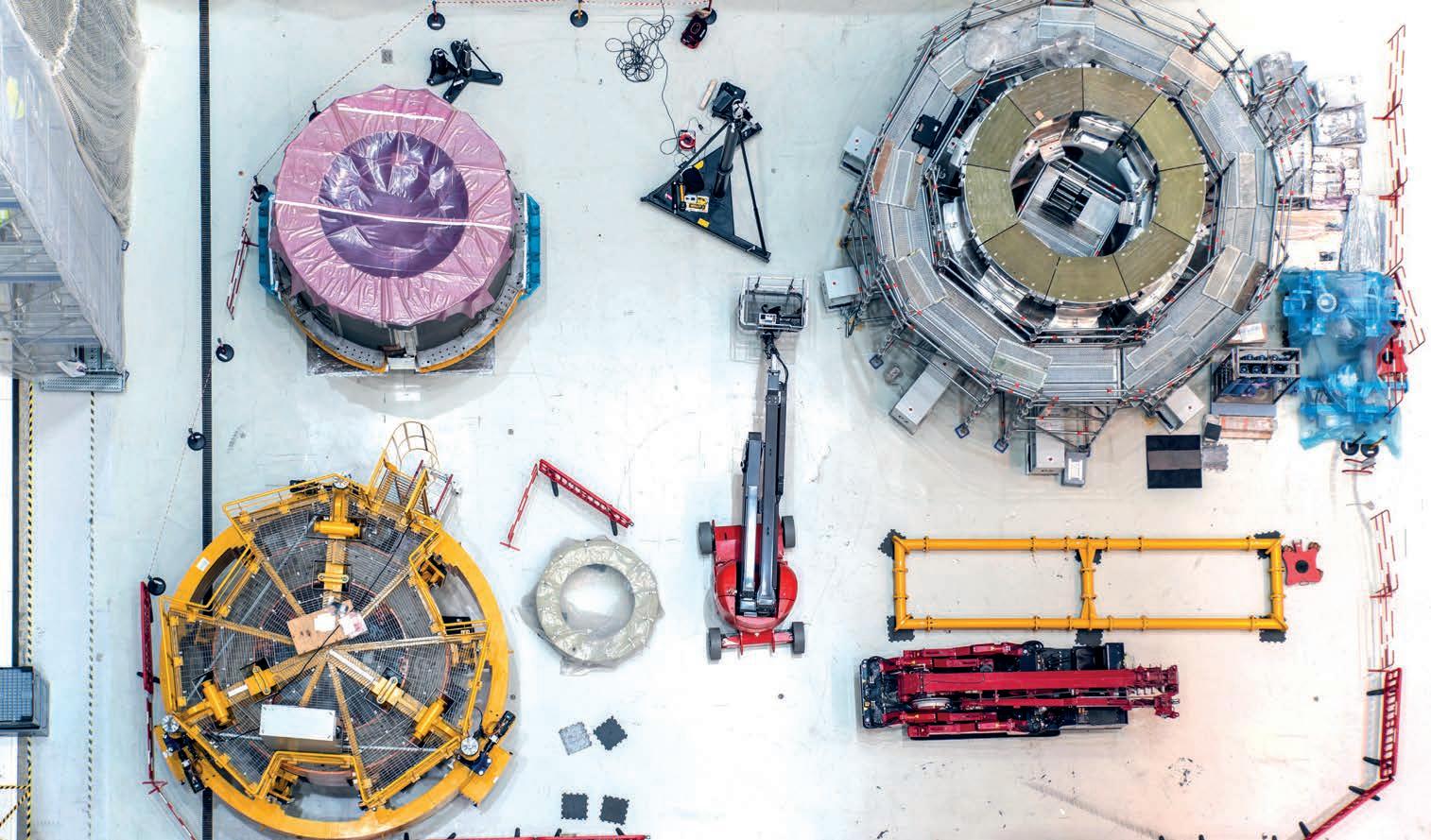



A second ring-shaped poloidal field coil (17 metres in diameter) is completed in 2021 by contractors in the European winding facility on site. Poloidal field coil #2 will be stored until it is needed in the machine assembly sequence. December 2021


The second vacuum vessel sector delivered by Korea (#1(7)) was upended and installed on tooling in December; since then, teams have been working on creating the complete sub-assembly. Something seems to have captured the attention of the technicians in this image. Perhaps a shouted instruction? February 2022
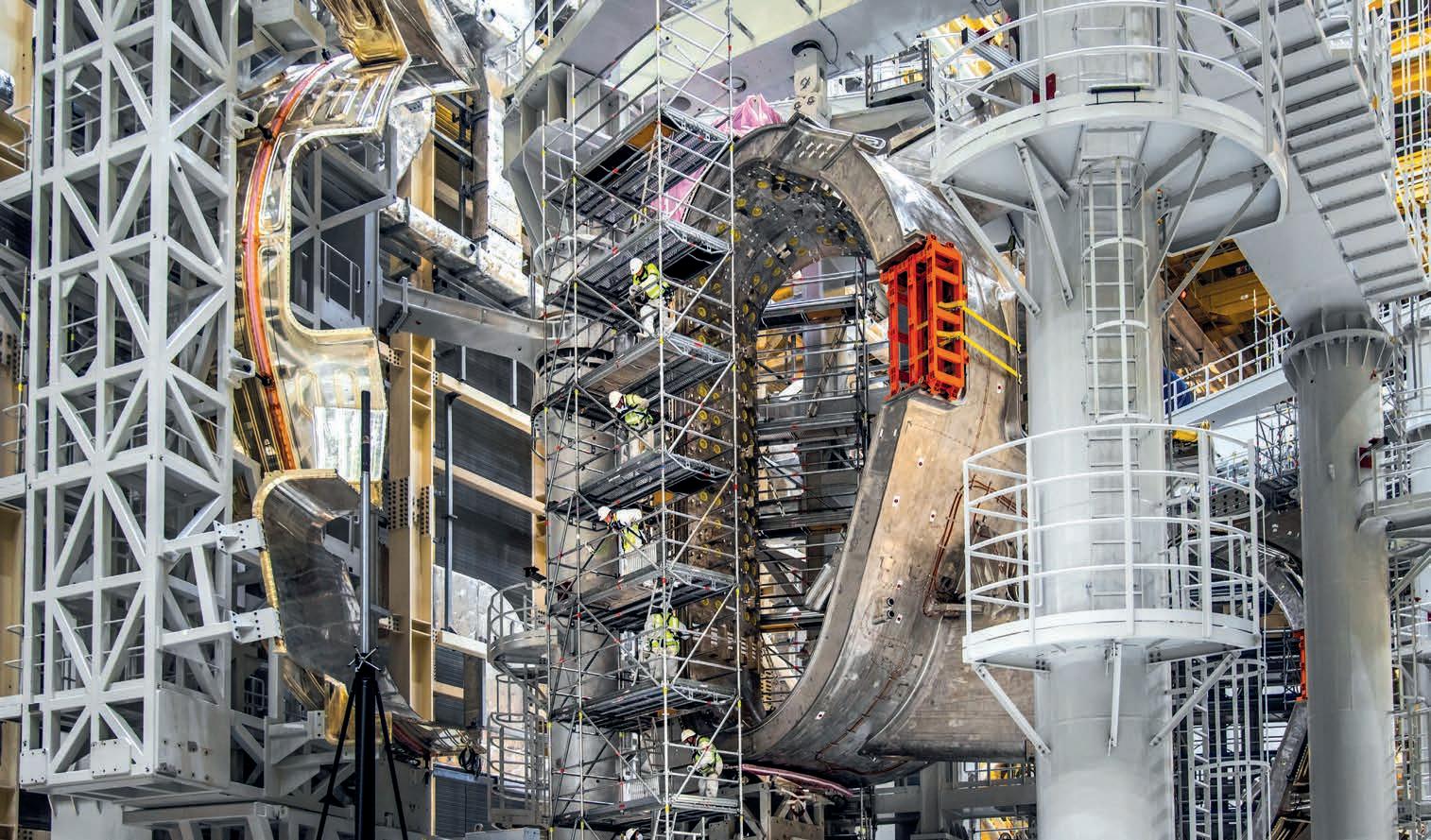


One-ninth of the ITER plasma chamber—a sector module weighing 1,380 tonnes including rigging—is successfully lifted out of tooling and installed in the Tokamak pit on 11 May 2022. The operation, which was months in the planning, went off without a hitch. Eight other similar assemblies will form the complete chamber and surrounding toroidal field coil superstructure. May 2022
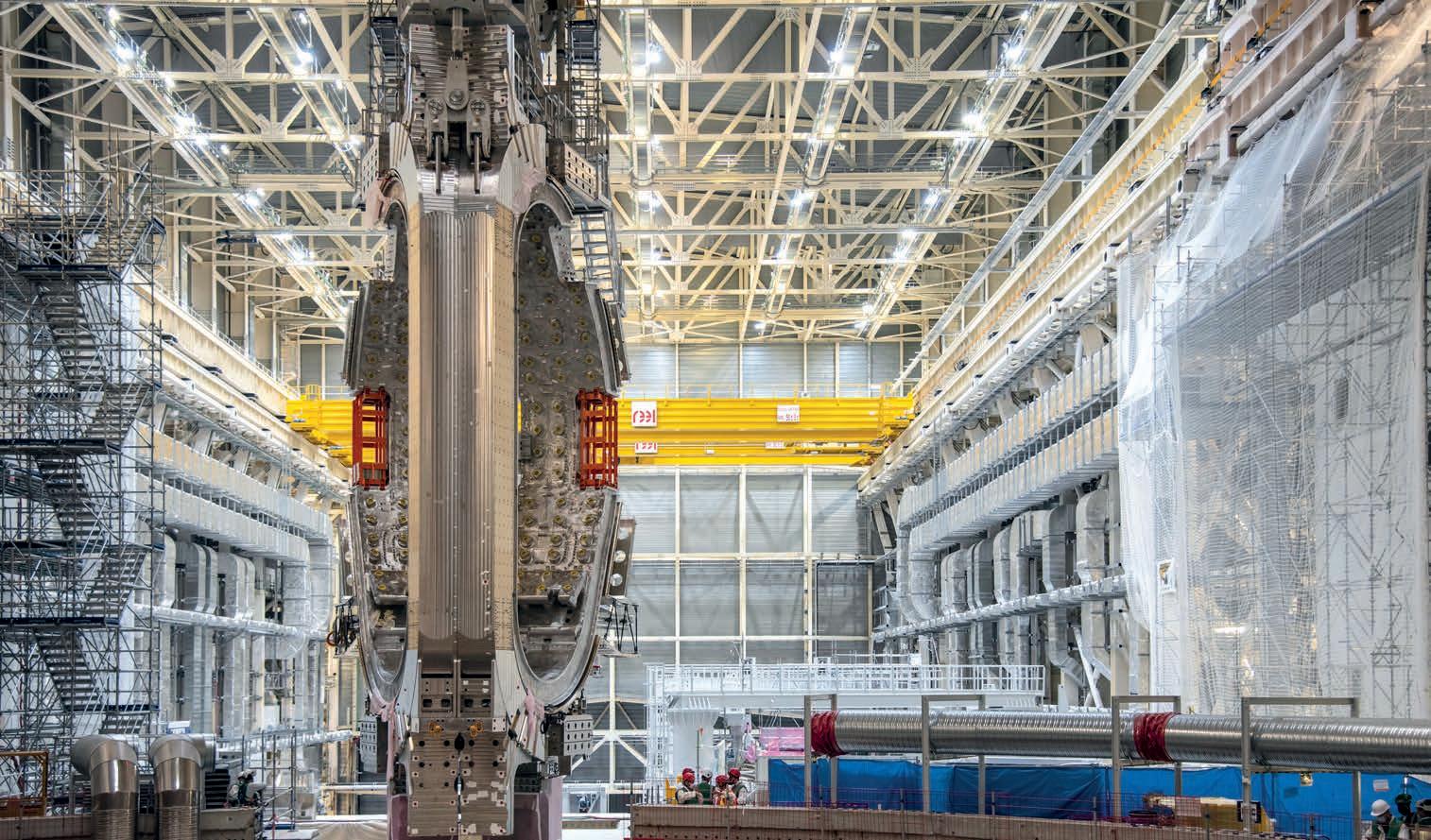
The sector module is suspended only 50 centimetres above its supports in the assembly pit, as the assembly team carries out the final positional operations. It will then be lowered to its supports, arriving “home” after a long and complex journey. May 2022

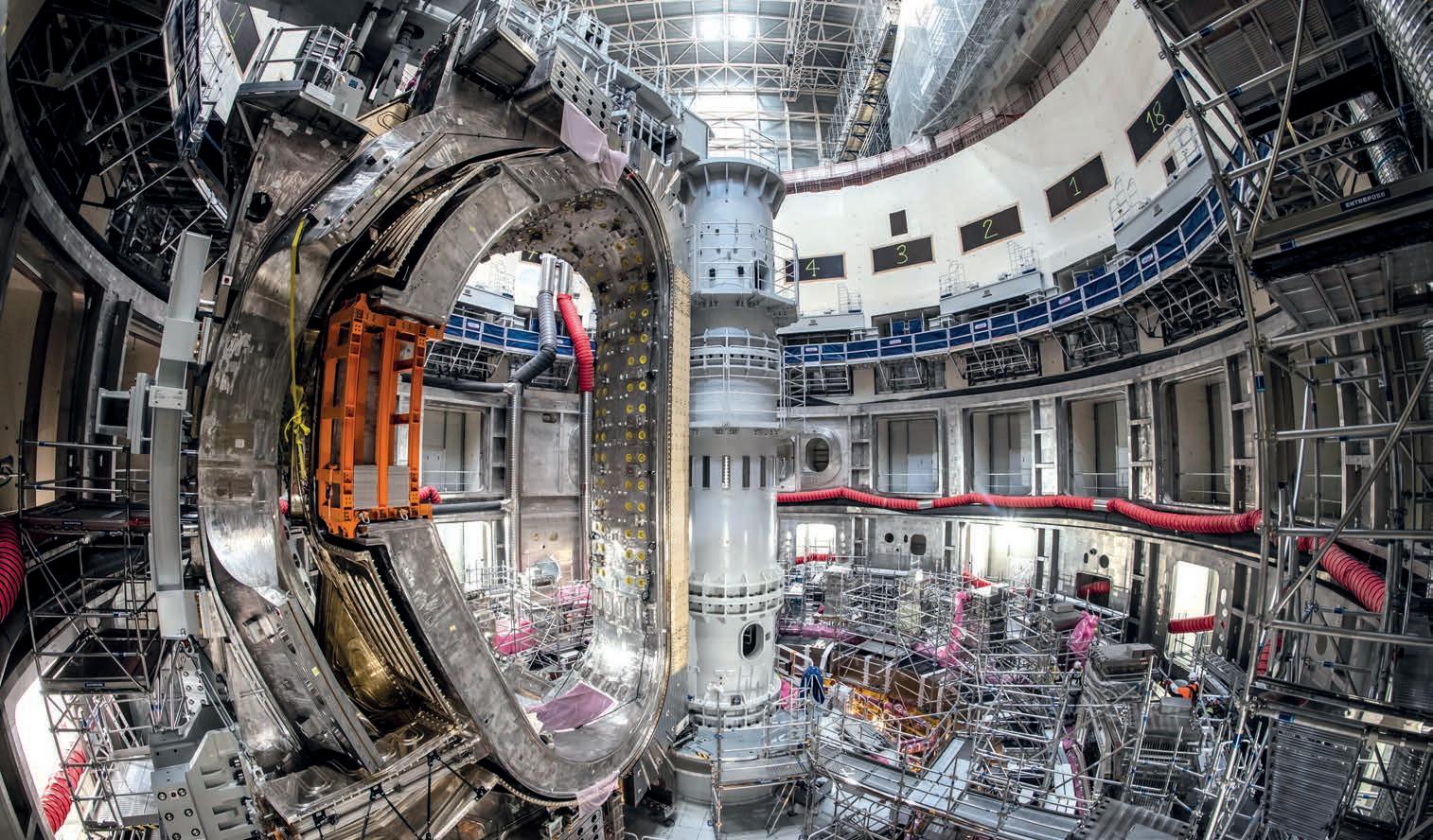










A unique aspect of ITER implementation is the in-kind procurement system that was established at the onset of the project. Rather than contributing purely financial resources, China, the European Union, India, Japan, Korea, Russia and the United States provide 90% of their contributions in the form of machine components, systems and – in the case of Europe – also buildings.
Procurement packages are shared equally (~ 9% of the total value) between China, India, Japan, Korea, Russia and the United States; Europe’s share, as Host Member, is ~ 45%.
The in-kind procurement arrangement is at the core of ITER’s founding philosophy, offering the ITER Members invaluable experience in the manufacturing of components for a fusion installation.
By contributing to the construction of the experimental machine, the ITER Members are creating and sharing the technological and industrial basis for the commercial fusion reactors of the future.
The project is also spurring developments in other fields, as companies apply the expertise acquired in the fabrication of ITER’s cutting-edge components and systems to other applications and technologies.




A second hot helium leak test facility has been commissioned in China for the testing of ITER blanket shield blocks. This type of testing is the definitive demonstration that a component can operate in an ultra-high vacuum environment.




Equipment from China has been installed in the Magnet Power Conversion buildings, which are the «stepping stones» between the power arriving at the ITER switchyard at 400 kV and the voltages required by the ITER magnets. In particular, China has supplied the 14 AC/DC converters that will provide controllable current/voltage to ITER’s six poloidal field coils.



Semi-circular magnet feeder elements are travelling from the Institute of Plasma Physics (ASIPP) in Hefei to the nearest port for shipment to ITER. China is providing approximately 1,600 tonnes of feeder segments, or 100 large components.





The European Domestic Agency, Fusion for Energy (F4E), is procuring five vacuum vessel sectors as part of its in-kind contributions. The first to be delivered to ITER (sector #5, pictured) is over 96% complete.



Planned for ITER’s Neutral Beam Test Facility in Italy, the MITICA testbed (for Megavolt ITER Injector and Concept Advancement) is a full-size prototype of the project’s 1 MV heating neutral beam injectors, capable of full acceleration voltage and power. Europe is procuring the beam source, including the beam stop elements under inspection in this image.




Representatives of Fusion for Energy (F4E), Research Instruments, and Metromecanica observe dimensional tests on a full-scale divertor inner vertical target prototype. The target’s surface is made of small monoblocks in tungsten, which can withstand some of the highest heat loads of the ITER machine.
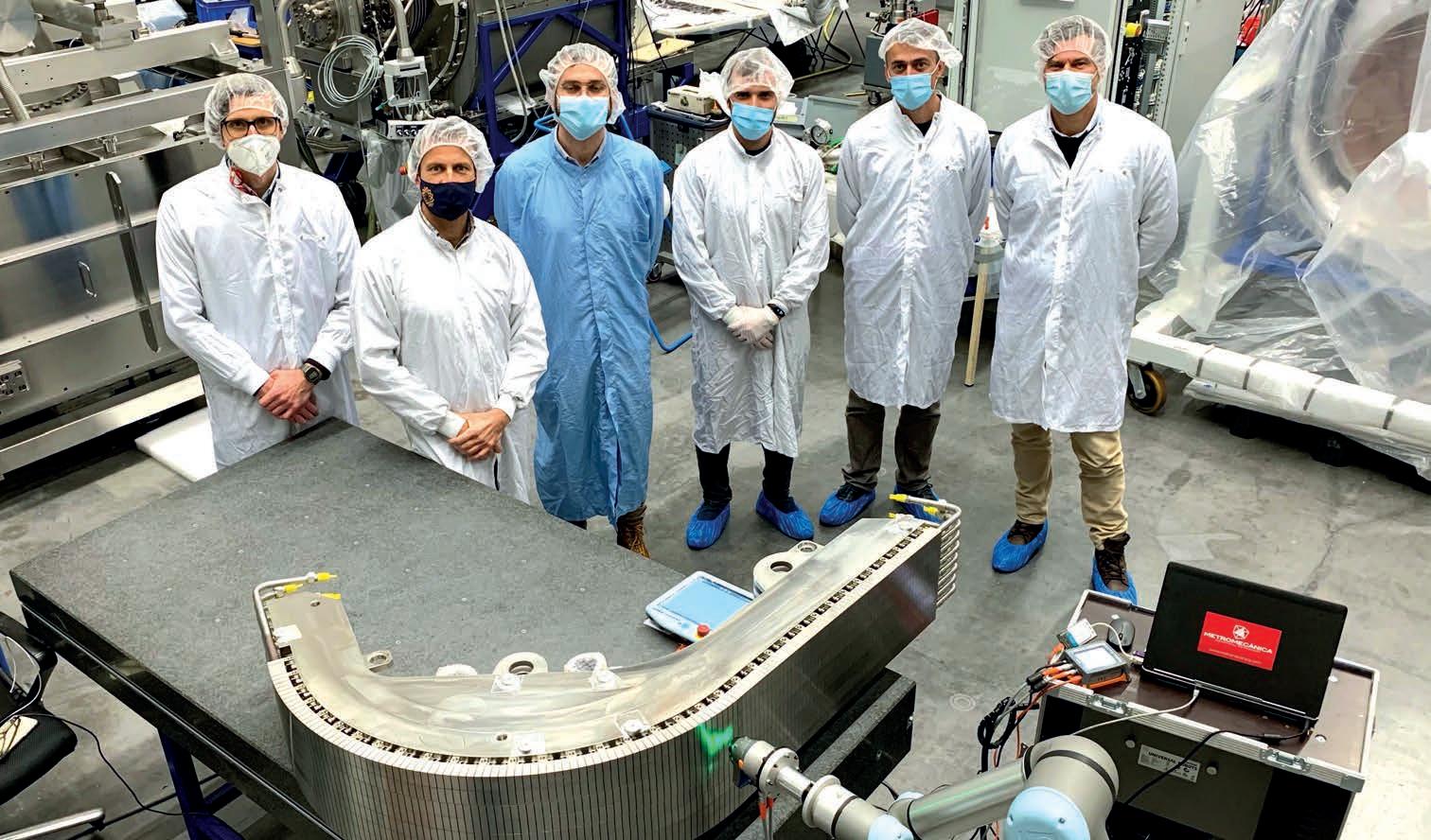


The four sections of the cryostat—the base, lower cylinder, upper cylinder and top lid—have been successively assembled and welded in the on-site Cryostat Workshop from 54 independent segments, each weighing an average of 50 tonnes. With the completion of the top lid (photo), the ITER community celebrates the completion of a yearslong industrial adventure.
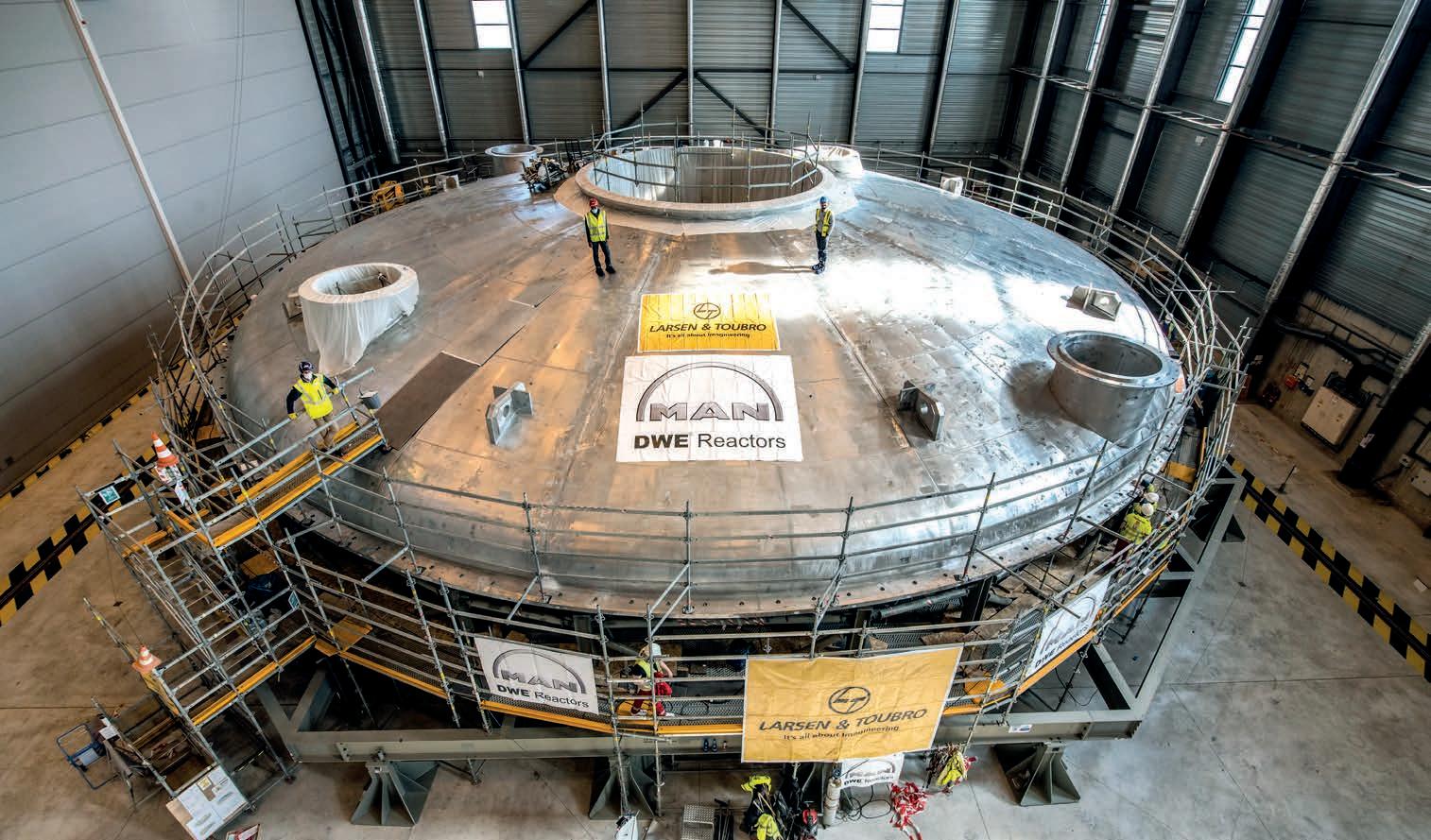


A complex system of cryolines will distribute the cooling power generated by the ITER cryoplant to clients throughout the installation. Four years after manufacturing was initiated, the last batch leaves INOXCVA’s Vadodara facility in July 2021.

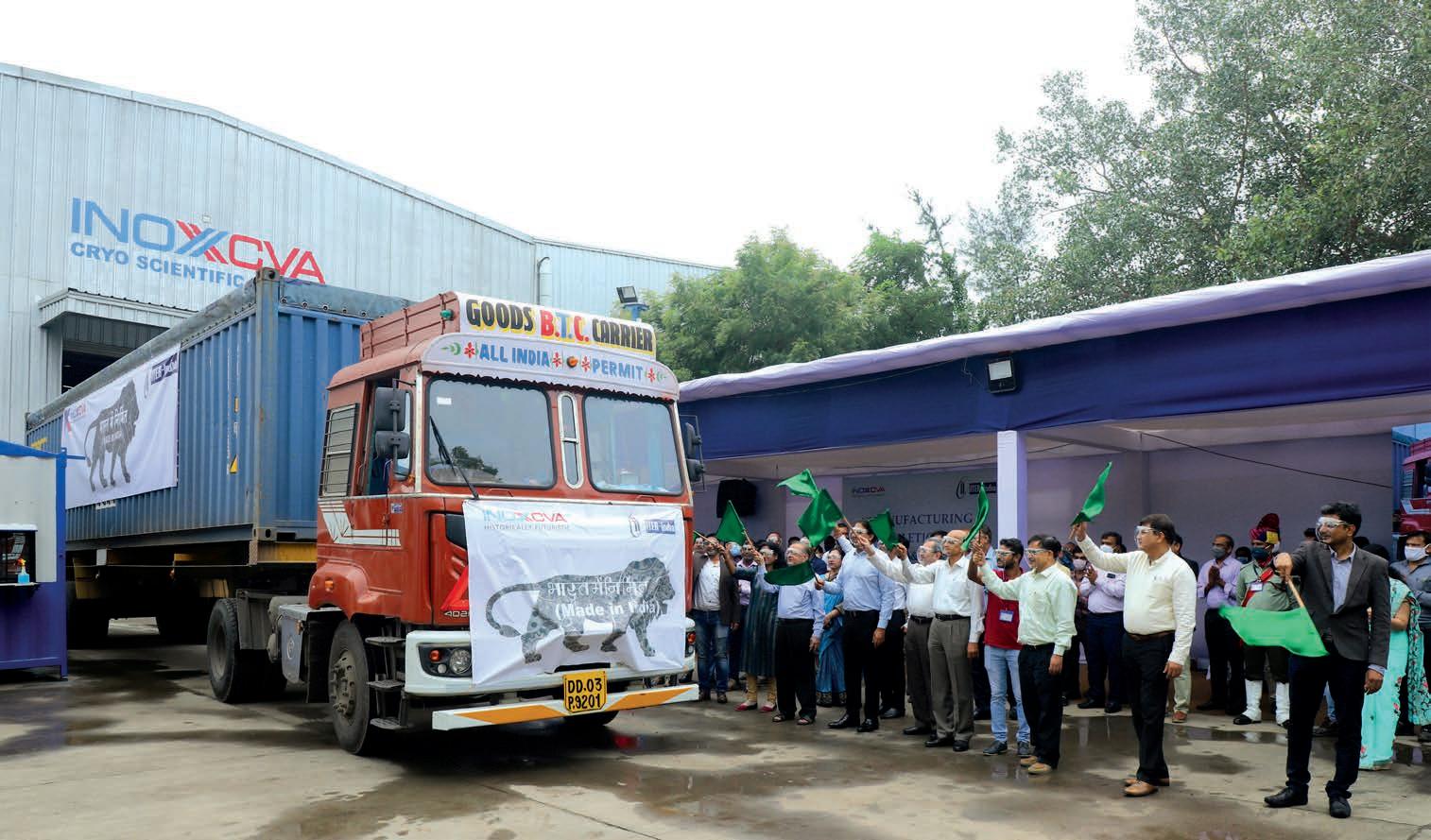


Nearly 25 tonnes of liquid helium at minus 269 °C will circulate in the ITER installation during operation. Four kilometres of process lines like these will carry cryogenic fluids from the cryoplant to clients in the Tokamak Building and back.



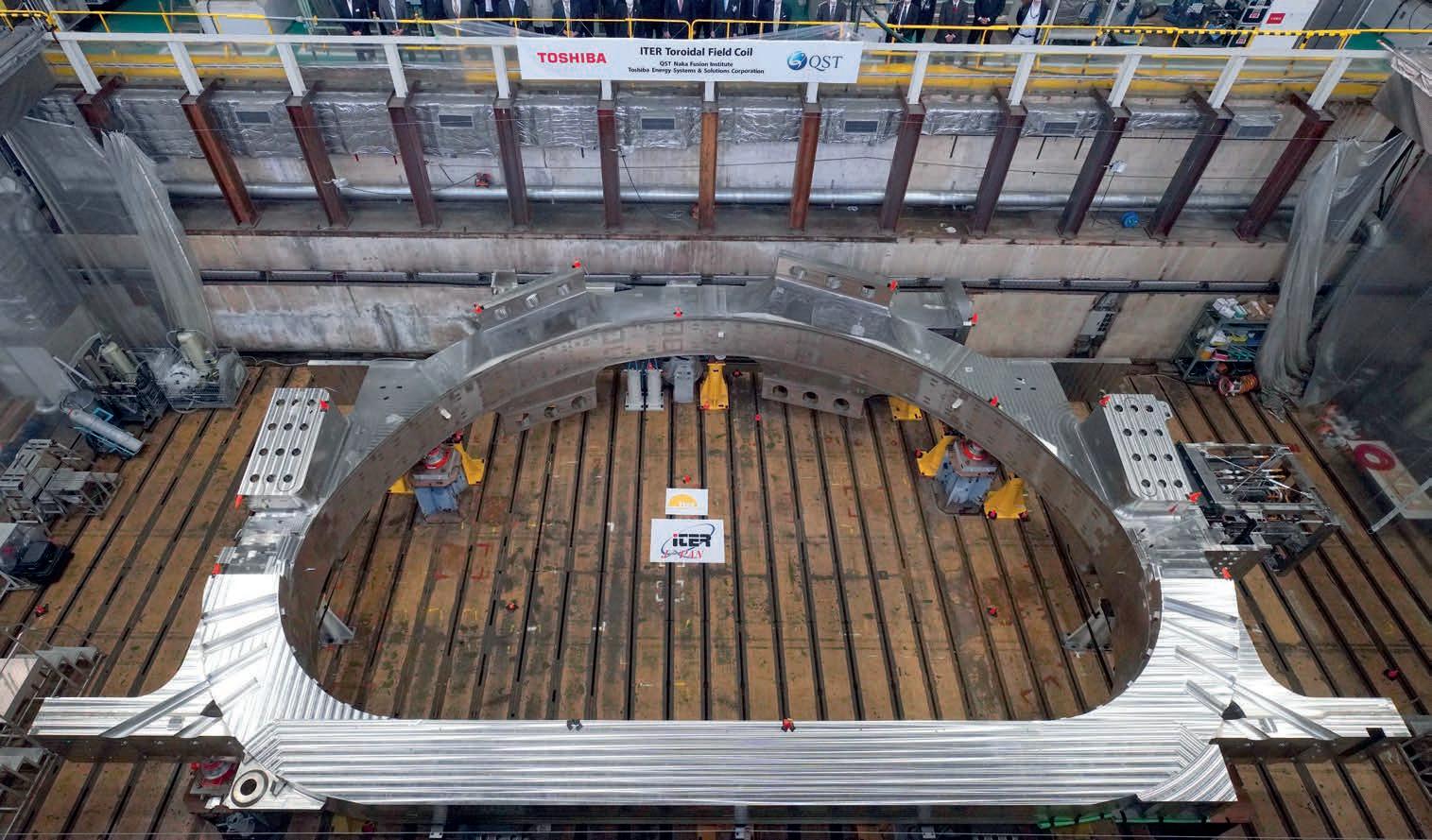

Plasma-facing units of the ITER divertor outer vertical target prototype have been mounted on a test assembly for high heat flux heating. The conditions at the bottom of the machine, where waste gas and impurities are exhausted from the reactor, can be described as “extreme.”



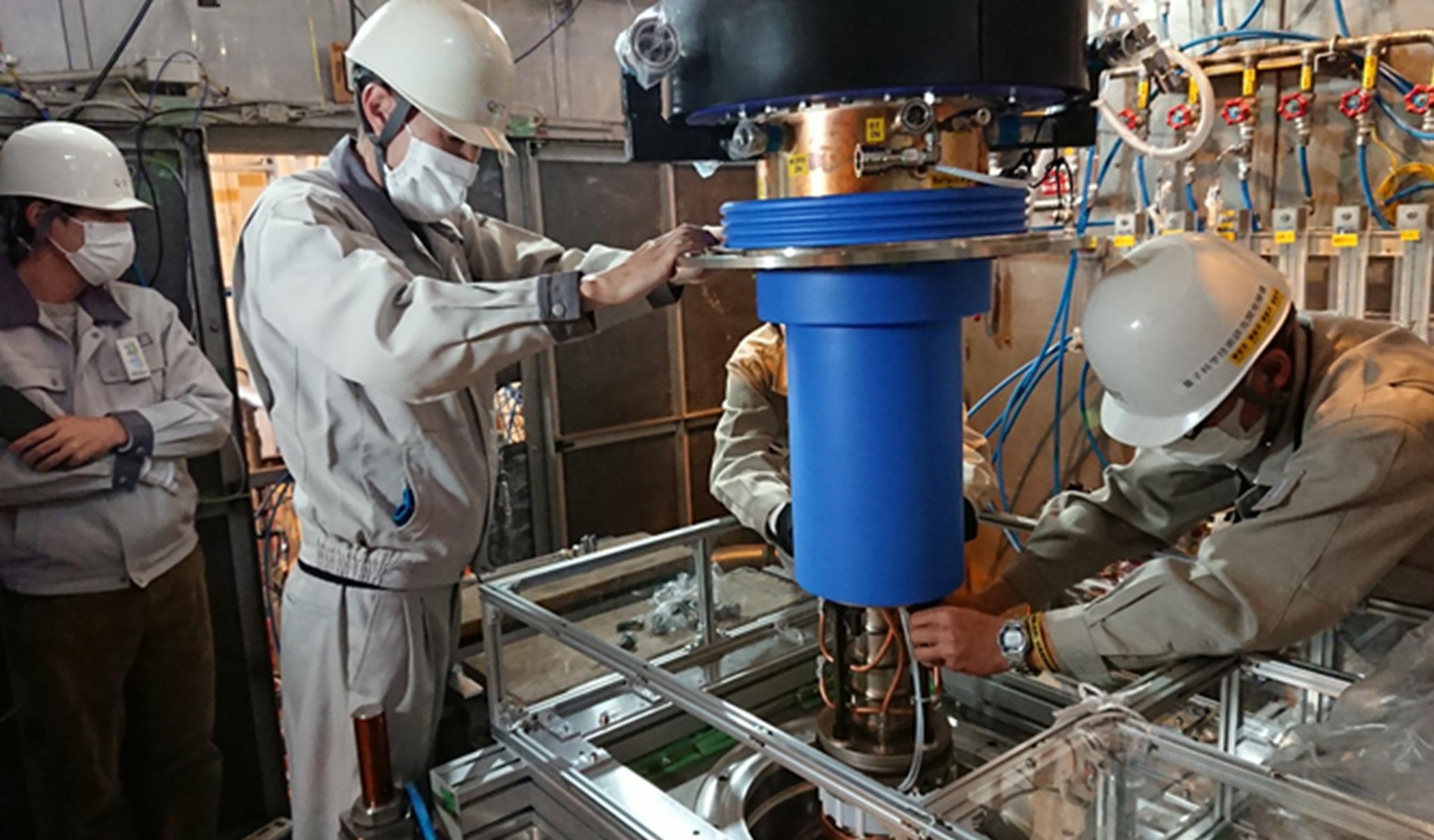

TF02(JA06) was the last remaining TF coil at MHI for tokamak assembly (excluding the spare). It was shipped out from its factory on 15 July 2021.
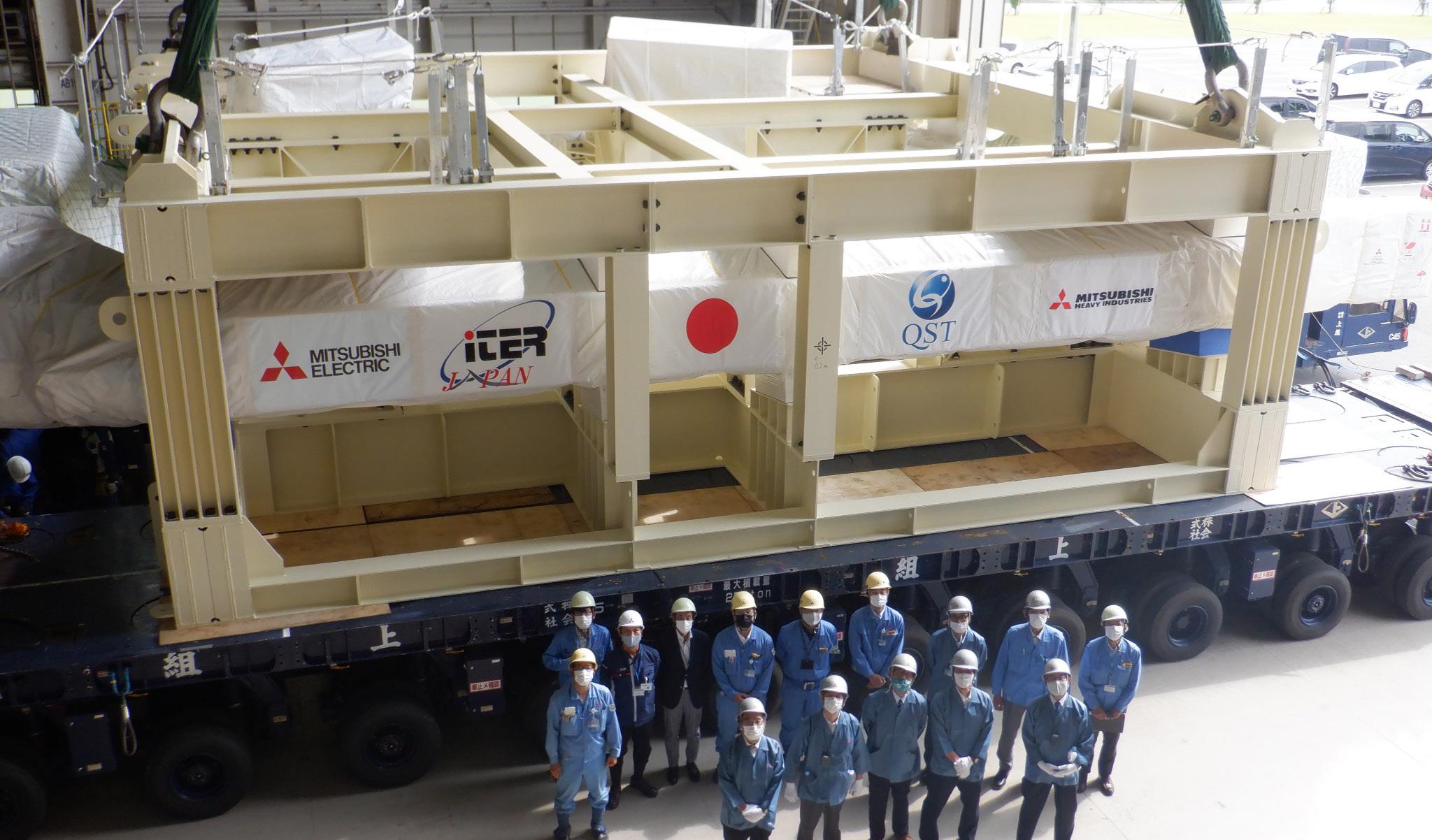


TF10(JA03) safely arrives at the ITER site on 19 November 2021. It was accompanied on its voyage at sea by another TF coil, TF02(JA06)).

Under clear skies, the fourth Japanese TF coil is ready to be shipped. In the center of the TF coil is the Japanese flag flanked by the logos of QST and the various TF coil manufacturers, symbolizing the extensive collaboration and teamwork by all contributors in Japan.






An improved series production line has started operations. This line has a production capacity of more than eight times that of the previous line thanks to the use of state-of-the-art automation and IoT technology.
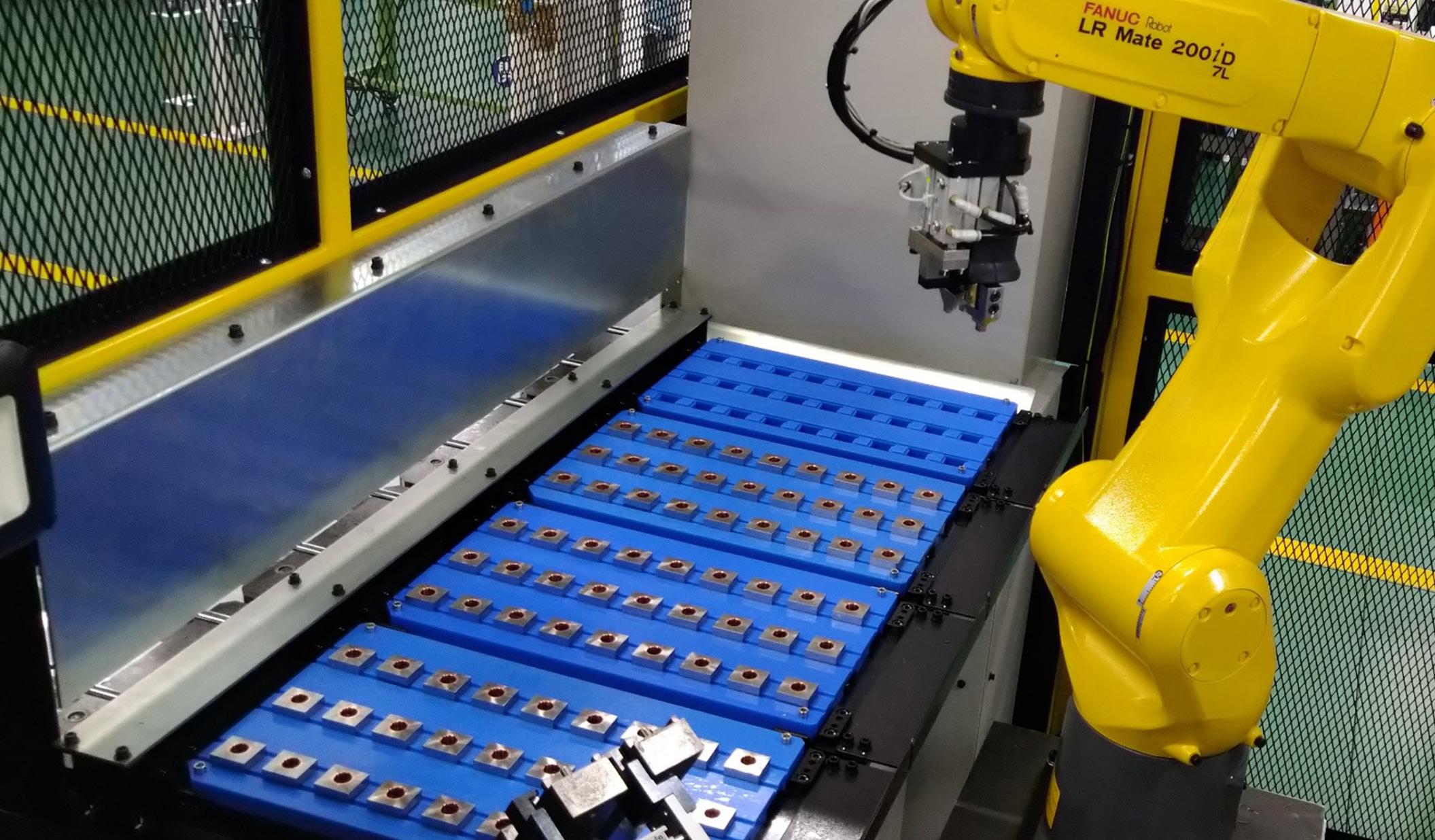


The manufacture of a test assembly for high heat flux tests has been completed. This photo shows the plasma-facing units of the ITER divertor outer vertical target prototype mounted on the test assembly.
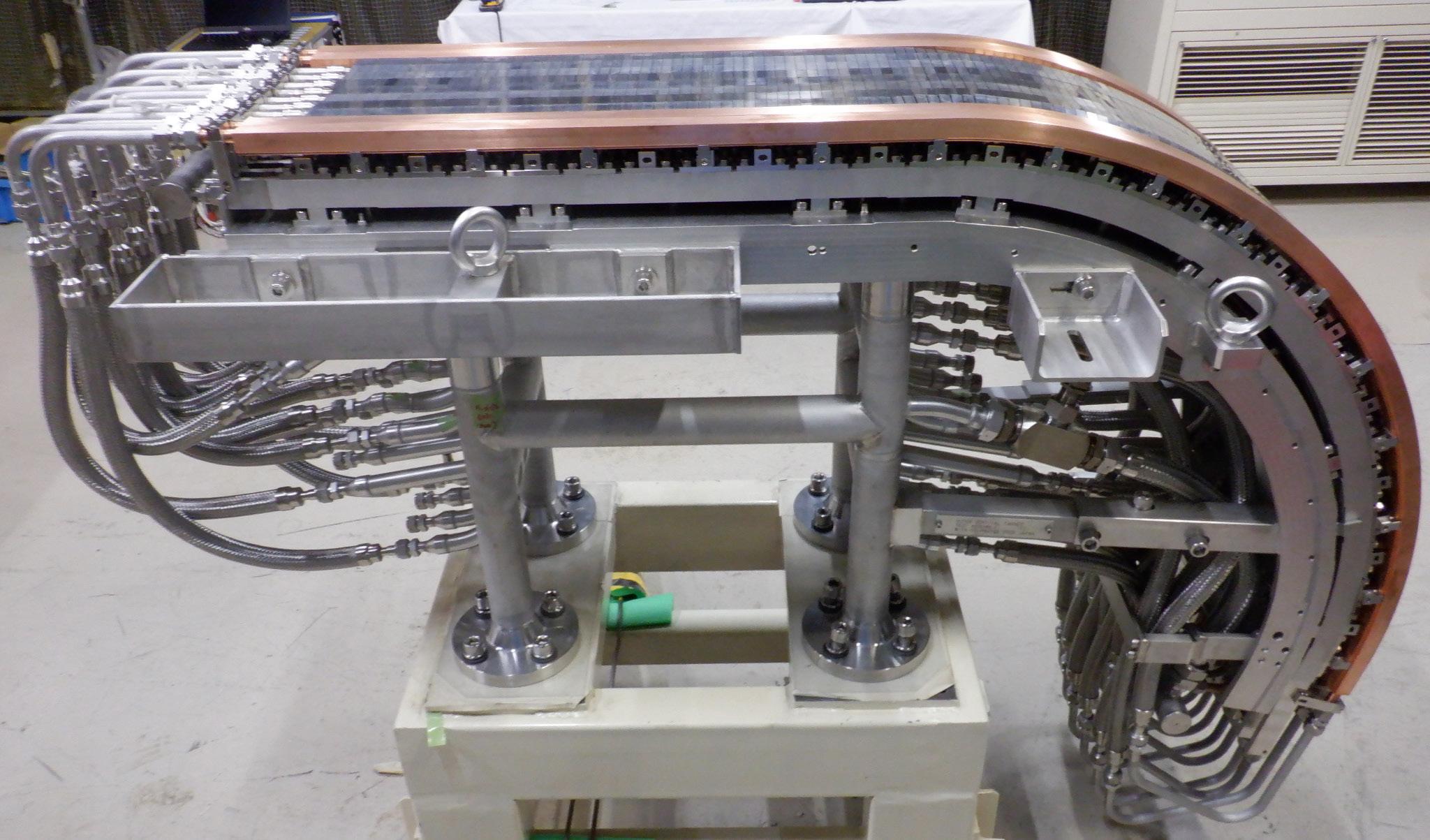

Engineers test a prototype of the control system for the ITER blanket remote handling system. On the left screen is a virtual reality model, on the right screen is the view from the camera. If you look closely you can spot the manipulator that is being controlled behind the screen.



A full-scale prototype of the manipulator, capable of handling 4-ton blanket modules, approaches a mock-up of the First Wall. Its posture is simulating the virtual-reality model from the robot controller tests shown in the previous photo.
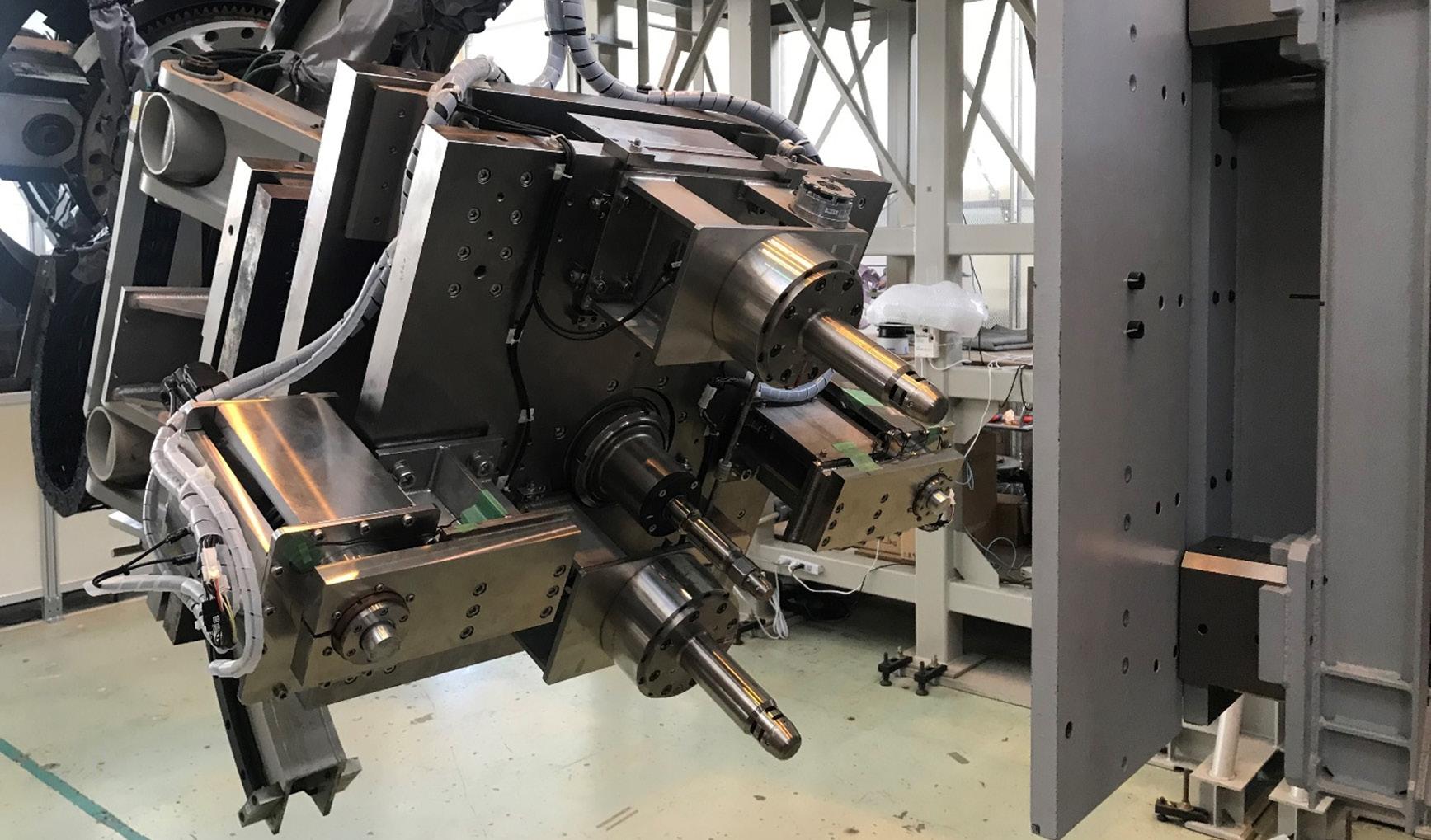


JADA/QST oversees the procurement of the in-vessel components of the micro fission chamber (MFC) system, which measures neutrons. These two crates are filled to the brim with not only the physical components but the technical know-how of the manufacturers.
This photo commemorates the completion of the first diagnostic components to be sent to the ITER site from Japan.


The test stand is ready to demonstrate a long pulse H- beam acceleration of more than 100s.


Diagnostic tools capture an ITER-class, high-power-density beam acceleration. Cameras monitor beam behavior during these long pulse operations.



QST has procured eight gyrotrons for ITER’s electron cyclotron external heating system. Four of these high technology “wave factories” have passed factory acceptance tests and will be delivered for First Plasma.
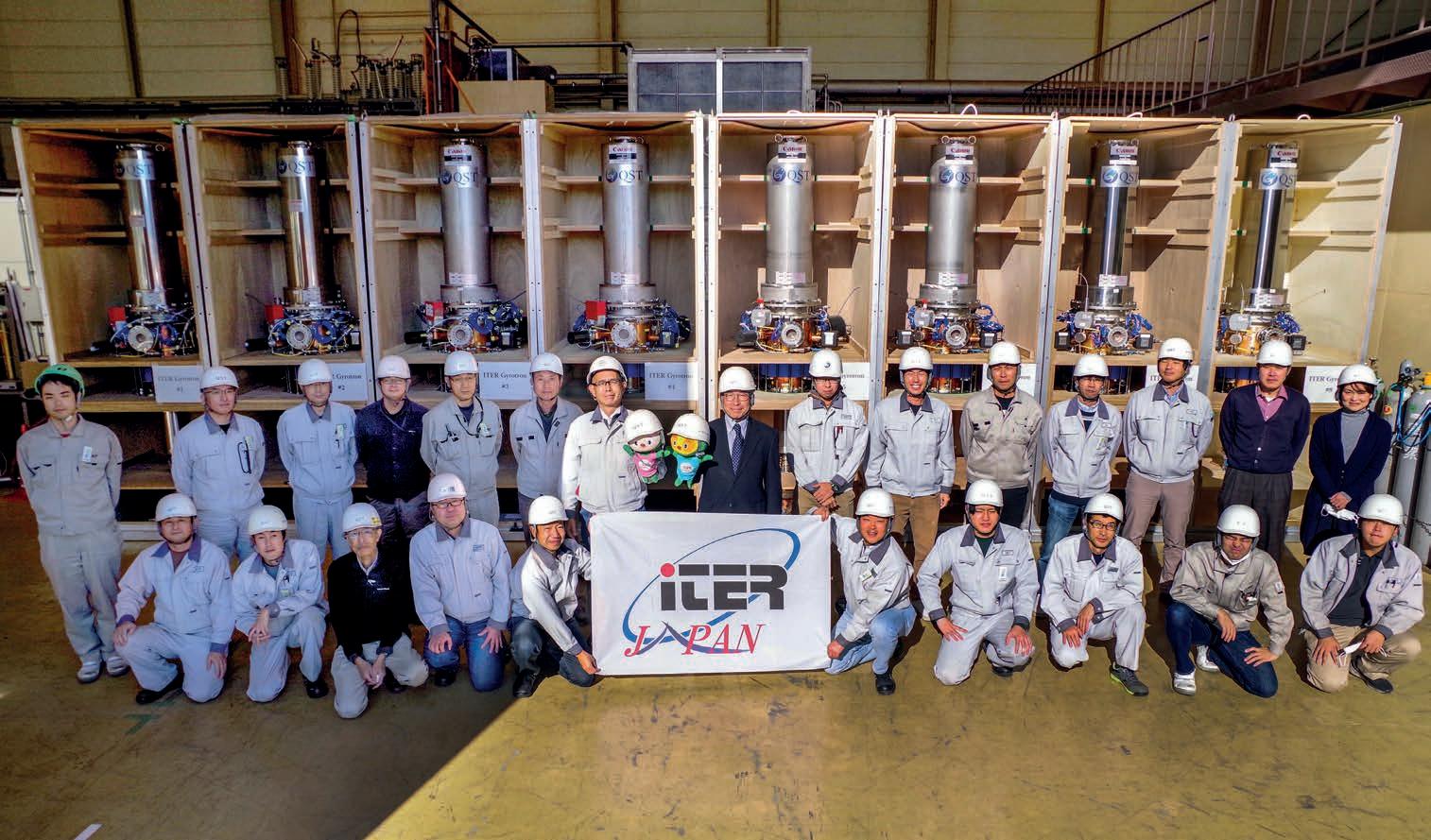


The factory acceptance test on the first ITER vacuum vessel gravity support has been successfully completed at Haneul Engineering in Gunsan, Korea. Under the plasma chamber, nine gravity supports will allow for the vacuum vessel’s thermal expansion and sustain loads in the radial, toroidal and vertical directions.
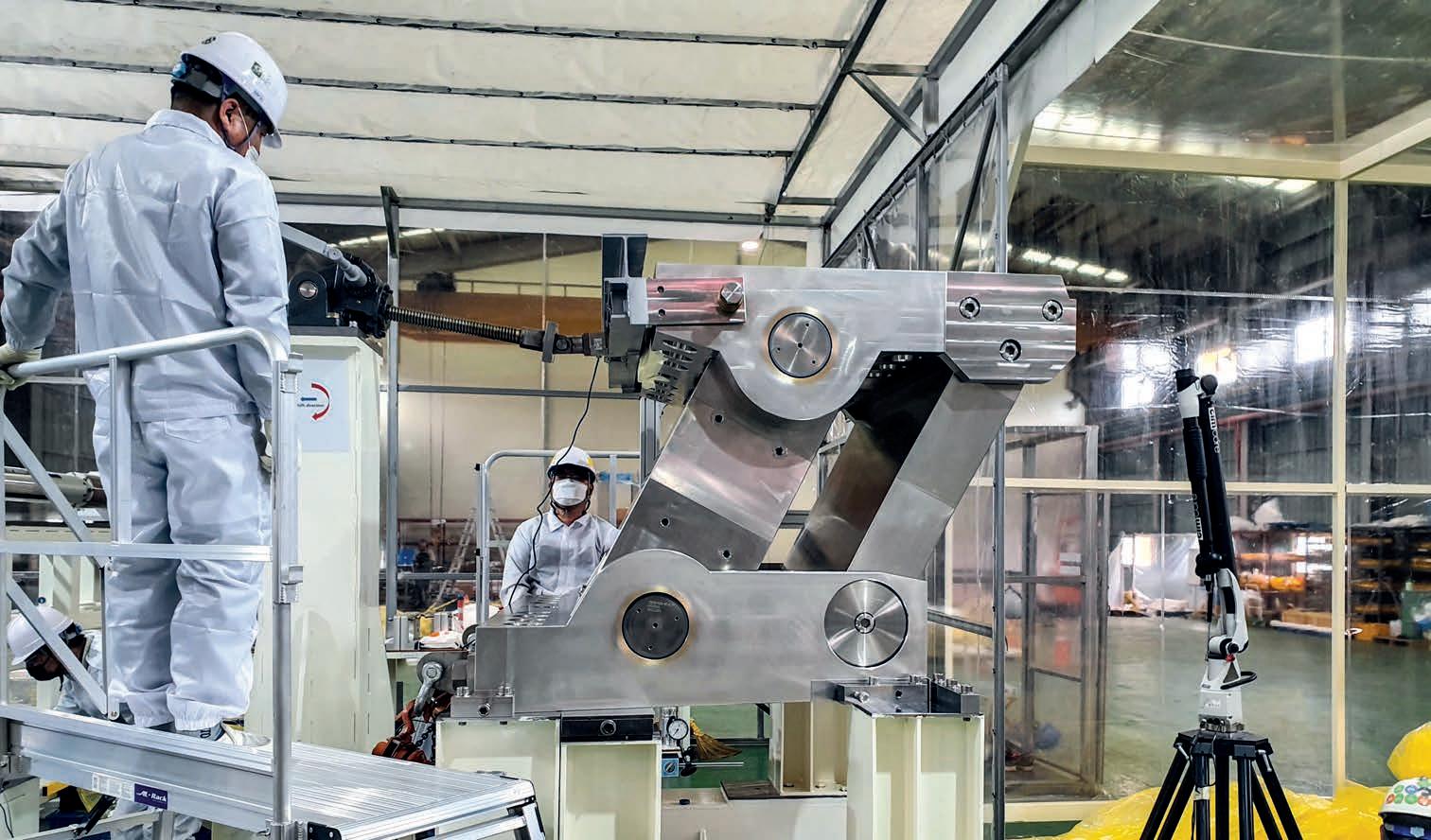



The installation of Korean-made AC/DC converters (17 units) in the Magnet Power Conversion buildings is progressing. This photo shows the insulation voltage test of the AC/DC converters that will provide current to the correction coils.
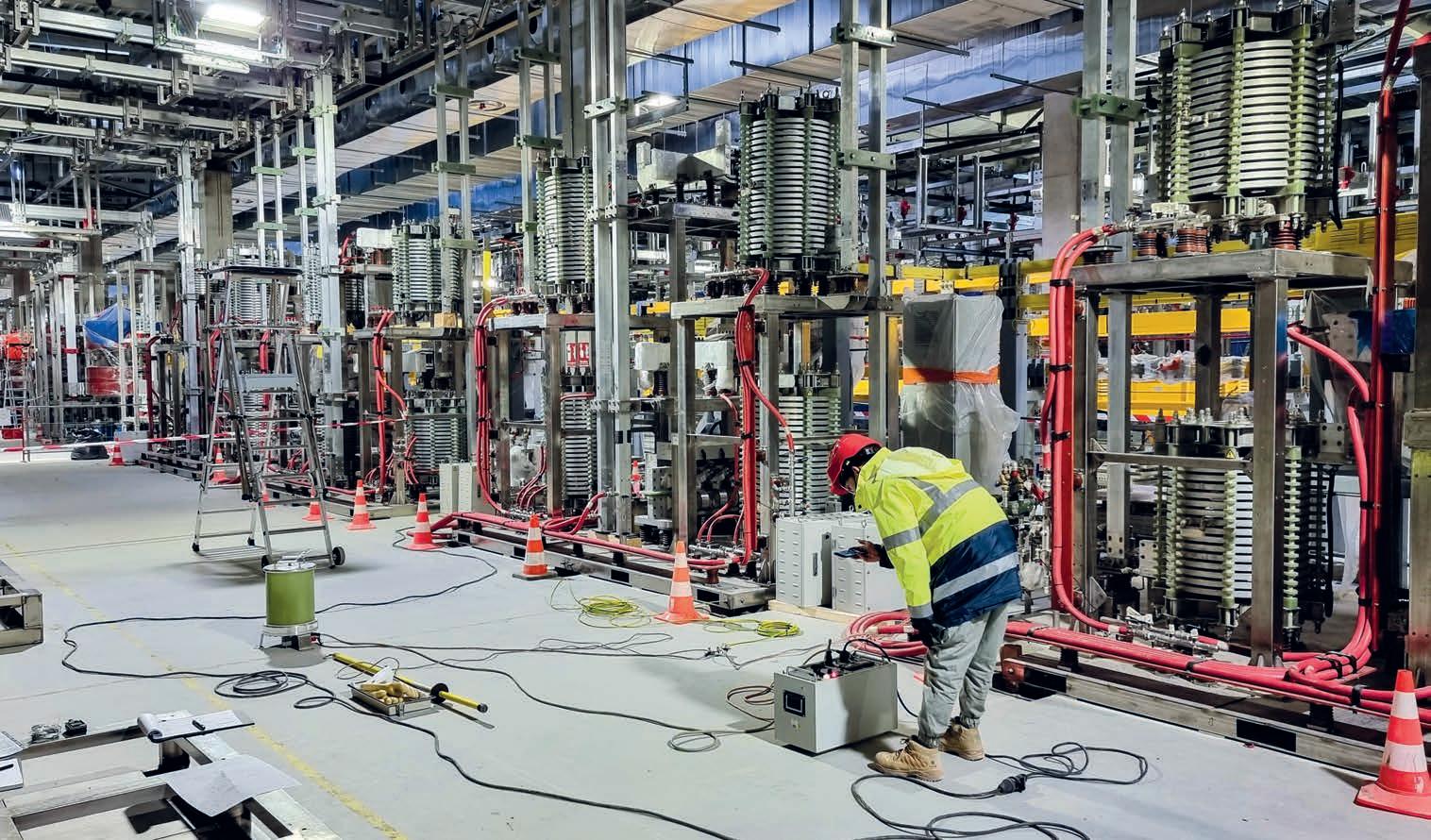



In early 2021, Russian specialists complete the vacuum pressure impregnation of poloidal field coil #1 (PF1), conferring electrical insulation with extremely high dielectric and mechanical strength to the component. In March 2022, the magnet successfully passes all factory tests.






The upgraded spherical tokamak Globus-M2 at the Ioffe Institute in Saint-Petersburg is used to test and calibrate the laser sources and spectrometers of the Thomson scattering diagnostic system for the ITER divertor.
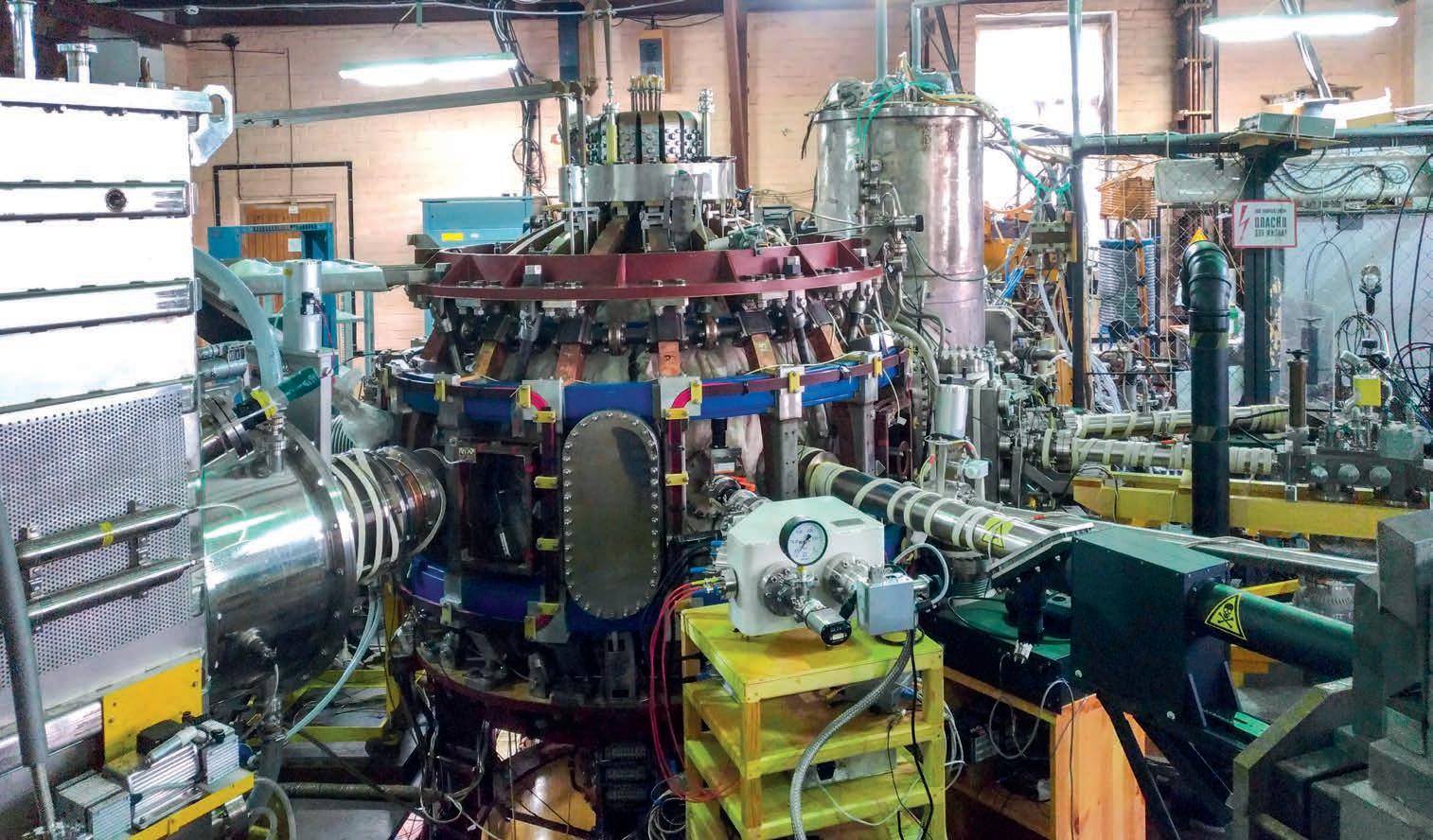


At a spectroscopic laboratory in Moscow, Russian Domestic Agency specialists are working to support the development of optical diagnostic systems for ITER, such as the Charge eXchange Recombination Spectroscopy (CXRS) Edge diagnostic.



In June 2021, a massive girder truck delivers the first 110-tonne central solenoid module to the port in Houston, Texas, from its manufacturing location in southern California. A second module follows the same route in October.





Prototypes for the low field side reflectometer diagnostic are in development at General Atomics.
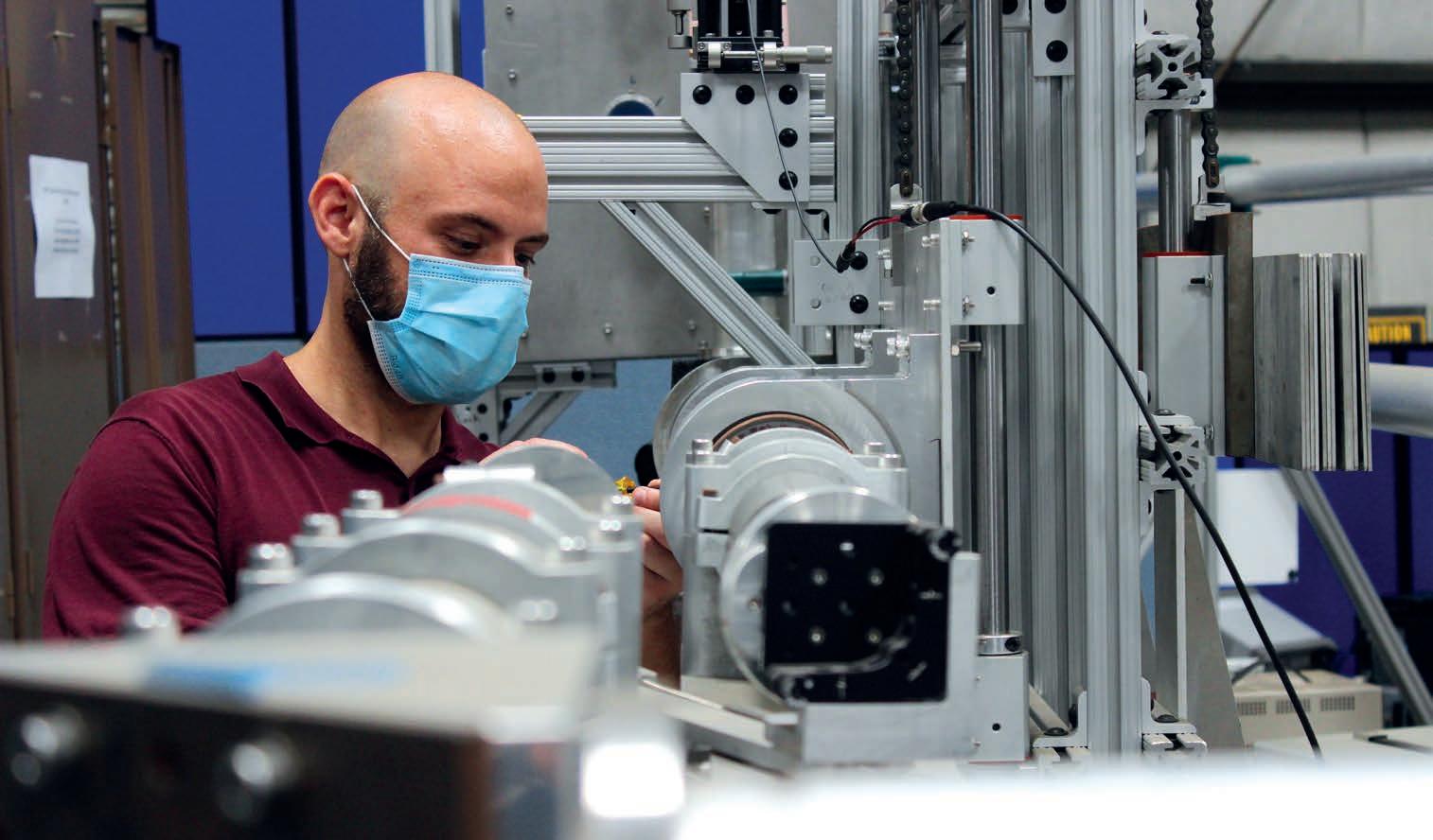







Director-General of the ITER Organization since March 2015, Bernard Bigot passed away on 14 May 2022 due to illness. An inspirational leader for more than four decades across multiple fields of science and energy, his personal dedication and commitment to ITER shaped every aspect of the project. Well beyond ITER and the international research community, his premature passing is felt as a tremendous loss. Dr Bigot will be remembered as a visionary leader, intensely focused on the enhancement of global society and the desire to leave the world a better place.
